#unify conscious
Text
#Grand Unified Theory#unified field#unified field theory#science#mind#universe#gravitation#soul#consciousness#self conscious#meditation#awareness#self awareness
0 notes
Text
i do like the hunger games movies — like, as far as book adaptations go, things were relatively good — but they were WRONG for not including the little bit of haymitch’s backstory in the catching fire movie. the pieces of haymitch’s backstory that the books gave us offered a LOT of insight into his motivations and the way he trusts & understands katniss irrevocably. haymitch’s games were a quarter quell, too. he lost an ally, too. and more importantly, he was the first person to realize that the force fields that surround the arenas are deadly, and he used that to his advantage and won the games as a result. his actions were seen as an act of rebellion by the capitol, and so snow had his family killed. the next, and only other person to ever do this — to use the force field as a weapon — was katniss. she didn’t come up with the idea on her own. she got it from witnessing clips of haymitch’s games. and she knew what it could cost, and she did it anyway. and that was what officially set the wheels of the rebellion into motion. it was a flame that haymitch had sparked years ago, even if it wasn’t a conscious intention. at the time of his own games, the people weren’t ready to unify and rebel as a cohesive unit, but once katniss used his same method, they were. the parallels between haymitch and katniss run deep, and he trusts her irrevocably. he knew exactly what she was about to do when she said “yes” in the tributes meeting, and he stood behind her immediately. haymitch is arguably the one and only person who understands katniss in her entirety. he has felt the same grief, undergone the same tragedies, and held the same passion that begged for a better world.
7K notes
·
View notes
Text
deferred occupancy [+ rant]
as per neville, this is the common fault of man and i agree. sadly to say, i have done the same.
what does deferred occupancy mean?
you are not occupying the state right now. you are waiting until you tap into the void. you are waiting until the 3d conforms. you are waiting until someone gives it to you. but you are not occupying it right now.
you have in mind to occupy it later or you will experience the state when it comes in the 3d, not realising that the state must be fulfilled first in imagination then it will materialise in the 3d.
do not keep creating, do not keep constructing, do not think of your desire as something that you are not one with already. you must occupy NOW. you must accept you have it NOW. daydream knowing what you are dreaming is true. script knowing what you are scripting is true right NOW.
you are not manifesting it. you have already manifested it.
continuously remind yourself that you are the only creator of your reality so that you do not become an inmate in this sense-world. break free from this illusion. you are the creator. you can control everything. you are a God in a human body. you are GOD. you are a beautiful divine spiritual being who is limitless. Humans were made in the likeness of God therefore we can do whatever God can do. There is no separation between God and me. None at all. We are one.
Stop viewing your desires as something not in your possession yet. Stop scripting as if you don't have it yet. You have it right now. The 4D comes first then the 3D conforms. The change in the 4D must be made. The change in self must be made.
It is fruitless to not occupy your state right now. You will keep daydreaming ABOUT your desires and not FROM. You will keep viewing the desires as something outside out of you, something that is not unified with you. This will lead you to keep running in circles, blaming the 3D for not conforming when it is you who has not changed self yet and deferred occupancy of your desired state.
Slam the door on any doubts or worries you have. I don't care, slam it. Ignore it. Oh what if my desires don't manifest? Who the fuck is the 3d to tell YOU, a GOD, what is a fact or not? Tell the doubts to go fuck themselves. Or gently scold them whatever floats your boat. Fact is, do not pay attention or you will keep running in circles. Just let go and believe. Just let go and try without controlling the outcome on a conscious level by worrying about time etc.. it will materialise soon, it has no choice but to!
Be still and know you are God {@lotusmi hehe}. It is done. Why? Because you said so. It is done because you fucking said so.
Remember who you are. You have the power to change anything in your life, simply by thinking from the desire; simply by becoming the desire. The external reality is extremely malleable and our creative mind is the Potter. We mold the external reality through our assumptions. If you assume something, it has no choice but to materialise. If you have FAITH, you will have it in the 3d. Even if you don't, you will still have it, especially if you work on your self concept.
Stop waiting. STOP WAITING! YOU HAVE IT NOW. YOU HAVE NOTHING TO WAIT FOR. Your unwillingness to accept you have it now already is what is delaying the externalisation of your manifestations. Because creation is finished! It's done!
You lost 100 euros and you're stressed? No youre not, 100 euros is like 1 cent to you. Tell your subconscious that you're not stressed because you're a millionaire and handle the situation as you would normally because the state is not lost! The outer man does not manifest, the inner man does; the real self does! The subcon only hears what you tell it, so tell it wonderful things. Accept you have these things. Do not wait. Do not wait PLEASE.
You have everything you need right now. All the knowledge needed, you have it already. It is done. It is done because you said it's done. And who are you to say it's done? You are God, you are the ONLY creator / molder of your reality, outside forces don't exist. Even if you believe outside forces exist, they have NO influence in your reality; NONE AT ALL. So, how can you say you don't have it when you are the creator?
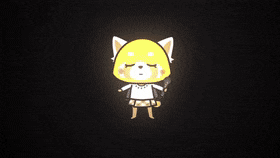
Occupy the state now. It is done. Stop waiting and think from it. You already are it. YOU HAVE IT RIGHT NOW. DO NOT BE A SLAVE TO THE 3D SENSES. YOU HAVE IT RIGHT NOW. YOU ARE IN CONTROL. YOU CAN DO THE IMPOSSIBLE. THERE IS NONE THAT CAN CONTROL YOUR EXPERIENCE EXCEPT YOU!!!!
THE 4D CREATES THE 3D. DO NOT PAY ATTENTION TO THE 3D. IT WILL AND MUST CHANGE IF YOU OCCUPY THE STATE EVEN BY JUST AFFIRMING. JUST HAVE IT RIGHT NOW. HAVE IT. YOU ALREADY DO. IT'S DONE
YOURE SCARED? NO YOURE NOT. WHY WOULD YOU BE SCARED? WHY WOULD YOU ASSUME YOU WILL FEEL SCARED WHEN THE DESIRES MANIFEST? ASSUME THAT YOU FEEL ONLY THE BEST EMOTIONS AND ONLY GOOD THINGS HAPPEN TO YOU.
THE CHANGE OF THE 3D IS NOT PERMANENT. IT IS EASILY MOLDED. IT IS NOT HARD. YOU CREATED IT. IF YOU REGRET SOMETHING, GO BACK. BUT DO NOT LET THE FEAR OF THE UNKNOWN HOLD YOU BACK FROM MANIFESTING TRUE UNBRIDLED HAPPINESS.
FUCK FEAR. IT HAS NO PLACE IN OUR LIVES. HOW CAN WE BE SCARED WHEN WE ARE IN CONTROL OF EACH ASPECT OF OUR LIVES? HOW CAN WE FUCKING DOUBT OURSELVES? GET UP. STAND UP. YOU HAVE IT NOW.
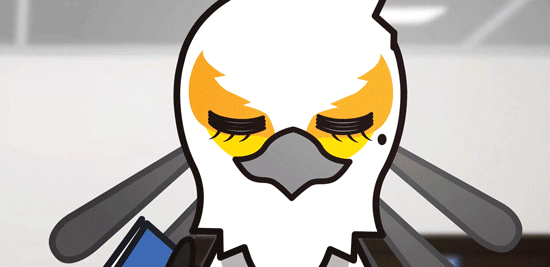
#law of assumption#loa#manifestation#neville goddard#law of attraction#affirmations#manifest#manifesting#self concept#void state#vaunting#void#vaunt#affs#consciousness#states#spirituality
2K notes
·
View notes
Text
The real AI fight
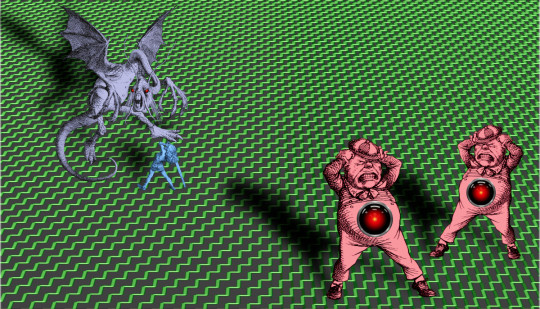
Tonight (November 27), I'm appearing at the Toronto Metro Reference Library with Facebook whistleblower Frances Haugen.
On November 29, I'm at NYC's Strand Books with my novel The Lost Cause, a solarpunk tale of hope and danger that Rebecca Solnit called "completely delightful."

Last week's spectacular OpenAI soap-opera hijacked the attention of millions of normal, productive people and nonsensually crammed them full of the fine details of the debate between "Effective Altruism" (doomers) and "Effective Accelerationism" (AKA e/acc), a genuinely absurd debate that was allegedly at the center of the drama.
Very broadly speaking: the Effective Altruists are doomers, who believe that Large Language Models (AKA "spicy autocomplete") will someday become so advanced that it could wake up and annihilate or enslave the human race. To prevent this, we need to employ "AI Safety" – measures that will turn superintelligence into a servant or a partner, nor an adversary.
Contrast this with the Effective Accelerationists, who also believe that LLMs will someday become superintelligences with the potential to annihilate or enslave humanity – but they nevertheless advocate for faster AI development, with fewer "safety" measures, in order to produce an "upward spiral" in the "techno-capital machine."
Once-and-future OpenAI CEO Altman is said to be an accelerationists who was forced out of the company by the Altruists, who were subsequently bested, ousted, and replaced by Larry fucking Summers. This, we're told, is the ideological battle over AI: should cautiously progress our LLMs into superintelligences with safety in mind, or go full speed ahead and trust to market forces to tame and harness the superintelligences to come?
This "AI debate" is pretty stupid, proceeding as it does from the foregone conclusion that adding compute power and data to the next-word-predictor program will eventually create a conscious being, which will then inevitably become a superbeing. This is a proposition akin to the idea that if we keep breeding faster and faster horses, we'll get a locomotive:
https://locusmag.com/2020/07/cory-doctorow-full-employment/
As Molly White writes, this isn't much of a debate. The "two sides" of this debate are as similar as Tweedledee and Tweedledum. Yes, they're arrayed against each other in battle, so furious with each other that they're tearing their hair out. But for people who don't take any of this mystical nonsense about spontaneous consciousness arising from applied statistics seriously, these two sides are nearly indistinguishable, sharing as they do this extremely weird belief. The fact that they've split into warring factions on its particulars is less important than their unified belief in the certain coming of the paperclip-maximizing apocalypse:
https://newsletter.mollywhite.net/p/effective-obfuscation
White points out that there's another, much more distinct side in this AI debate – as different and distant from Dee and Dum as a Beamish Boy and a Jabberwork. This is the side of AI Ethics – the side that worries about "today’s issues of ghost labor, algorithmic bias, and erosion of the rights of artists and others." As White says, shifting the debate to existential risk from a future, hypothetical superintelligence "is incredibly convenient for the powerful individuals and companies who stand to profit from AI."
After all, both sides plan to make money selling AI tools to corporations, whose track record in deploying algorithmic "decision support" systems and other AI-based automation is pretty poor – like the claims-evaluation engine that Cigna uses to deny insurance claims:
https://www.propublica.org/article/cigna-pxdx-medical-health-insurance-rejection-claims
On a graph that plots the various positions on AI, the two groups of weirdos who disagree about how to create the inevitable superintelligence are effectively standing on the same spot, and the people who worry about the actual way that AI harms actual people right now are about a million miles away from that spot.
There's that old programmer joke, "There are 10 kinds of people, those who understand binary and those who don't." But of course, that joke could just as well be, "There are 10 kinds of people, those who understand ternary, those who understand binary, and those who don't understand either":
https://pluralistic.net/2021/12/11/the-ten-types-of-people/
What's more, the joke could be, "there are 10 kinds of people, those who understand hexadecenary, those who understand pentadecenary, those who understand tetradecenary [und so weiter] those who understand ternary, those who understand binary, and those who don't." That is to say, a "polarized" debate often has people who hold positions so far from the ones everyone is talking about that those belligerents' concerns are basically indistinguishable from one another.
The act of identifying these distant positions is a radical opening up of possibilities. Take the indigenous philosopher chief Red Jacket's response to the Christian missionaries who sought permission to proselytize to Red Jacket's people:
https://historymatters.gmu.edu/d/5790/
Red Jacket's whole rebuttal is a superb dunk, but it gets especially interesting where he points to the sectarian differences among Christians as evidence against the missionary's claim to having a single true faith, and in favor of the idea that his own people's traditional faith could be co-equal among Christian doctrines.
The split that White identifies isn't a split about whether AI tools can be useful. Plenty of us AI skeptics are happy to stipulate that there are good uses for AI. For example, I'm 100% in favor of the Human Rights Data Analysis Group using an LLM to classify and extract information from the Innocence Project New Orleans' wrongful conviction case files:
https://hrdag.org/tech-notes/large-language-models-IPNO.html
Automating "extracting officer information from documents – specifically, the officer's name and the role the officer played in the wrongful conviction" was a key step to freeing innocent people from prison, and an LLM allowed HRDAG – a tiny, cash-strapped, excellent nonprofit – to make a giant leap forward in a vital project. I'm a donor to HRDAG and you should donate to them too:
https://hrdag.networkforgood.com/
Good data-analysis is key to addressing many of our thorniest, most pressing problems. As Ben Goldacre recounts in his inaugural Oxford lecture, it is both possible and desirable to build ethical, privacy-preserving systems for analyzing the most sensitive personal data (NHS patient records) that yield scores of solid, ground-breaking medical and scientific insights:
https://www.youtube.com/watch?v=_-eaV8SWdjQ
The difference between this kind of work – HRDAG's exoneration work and Goldacre's medical research – and the approach that OpenAI and its competitors take boils down to how they treat humans. The former treats all humans as worthy of respect and consideration. The latter treats humans as instruments – for profit in the short term, and for creating a hypothetical superintelligence in the (very) long term.
As Terry Pratchett's Granny Weatherwax reminds us, this is the root of all sin: "sin is when you treat people like things":
https://brer-powerofbabel.blogspot.com/2009/02/granny-weatherwax-on-sin-favorite.html
So much of the criticism of AI misses this distinction – instead, this criticism starts by accepting the self-serving marketing claim of the "AI safety" crowd – that their software is on the verge of becoming self-aware, and is thus valuable, a good investment, and a good product to purchase. This is Lee Vinsel's "Criti-Hype": "taking press releases from startups and covering them with hellscapes":
https://sts-news.medium.com/youre-doing-it-wrong-notes-on-criticism-and-technology-hype-18b08b4307e5
Criti-hype and AI were made for each other. Emily M Bender is a tireless cataloger of criti-hypeists, like the newspaper reporters who breathlessly repeat " completely unsubstantiated claims (marketing)…sourced to Altman":
https://dair-community.social/@emilymbender/111464030855880383
Bender, like White, is at pains to point out that the real debate isn't doomers vs accelerationists. That's just "billionaires throwing money at the hope of bringing about the speculative fiction stories they grew up reading – and philosophers and others feeling important by dressing these same silly ideas up in fancy words":
https://dair-community.social/@emilymbender/111464024432217299
All of this is just a distraction from real and important scientific questions about how (and whether) to make automation tools that steer clear of Granny Weatherwax's sin of "treating people like things." Bender – a computational linguist – isn't a reactionary who hates automation for its own sake. On Mystery AI Hype Theater 3000 – the excellent podcast she co-hosts with Alex Hanna – there is a machine-generated transcript:
https://www.buzzsprout.com/2126417
There is a serious, meaty debate to be had about the costs and possibilities of different forms of automation. But the superintelligence true-believers and their criti-hyping critics keep dragging us away from these important questions and into fanciful and pointless discussions of whether and how to appease the godlike computers we will create when we disassemble the solar system and turn it into computronium.
The question of machine intelligence isn't intrinsically unserious. As a materialist, I believe that whatever makes me "me" is the result of the physics and chemistry of processes inside and around my body. My disbelief in the existence of a soul means that I'm prepared to think that it might be possible for something made by humans to replicate something like whatever process makes me "me."
Ironically, the AI doomers and accelerationists claim that they, too, are materialists – and that's why they're so consumed with the idea of machine superintelligence. But it's precisely because I'm a materialist that I understand these hypotheticals about self-aware software are less important and less urgent than the material lives of people today.
It's because I'm a materialist that my primary concerns about AI are things like the climate impact of AI data-centers and the human impact of biased, opaque, incompetent and unfit algorithmic systems – not science fiction-inspired, self-induced panics over the human race being enslaved by our robot overlords.

If you'd like an essay-formatted version of this post to read or share, here's a link to it on pluralistic.net, my surveillance-free, ad-free, tracker-free blog:
https://pluralistic.net/2023/11/27/10-types-of-people/#taking-up-a-lot-of-space

Image:
Cryteria (modified) https://commons.wikimedia.org/wiki/File:HAL9000.svg
CC BY 3.0
https://creativecommons.org/licenses/by/3.0/deed.en
#pluralistic#criti-hype#ai doomers#doomers#eacc#effective acceleration#effective altruism#materialism#ai#10 types of people#data science#llms#large language models#patrick ball#ben goldacre#trusted research environments#science#hrdag#human rights data analysis group#red jacket#religion#emily bender#emily m bender#molly white
287 notes
·
View notes
Text
Flesh Wound

summary: Yuta shows up to his new school with a single goal in mind: stay under the radar. Only he lands in the direct path of the school's outcast- you, with your hemp cigarettes and permanent scowl. An unlikely friendship, dark pasts, and sweet nothings.
warnings: mature topics, TRIGGER WARNING: dissociation, description of self-harm, suicide
pairings : yuta x fem!reader (as teenagers and adults)
contents: slow burn, hurt/comfort, time jumps, no curse au, not canon, reader has piercings/tattoos/dyed hair (mentioned), aged-up in next part
wc: ~7k

“You’re in my seat.”
So much for laying low, Yuta thinks, which he has been successful in accomplishing up until this moment. He raises his head to see your steely gaze threatening to tear him to pieces and his mouth goes dry. He's too startled to get a proper look at you, but he immediately notices your septum piercing and the dark kohl lining your eyes.
“Oh, sorry!” he says lamely. He scrambles clumsily to his feet and resultantly knocks his binder to the floor. You're staring daggers at him as you lower yourself into your unassigned-assigned seat, and he bends to retrieve the fallen binder with shaking hands.
The desks in the classroom are arranged in pairs, most of which were already filled by a body or a backpack when Yuta walked in several minutes ago. Upon a quick survey, he sees that the only remaining option is the desk to your left, and something tells him there's a reason why it otherwise sits empty. He smiles at you nervously in hopes to dull the tension, but you've already looked away to pull a pair of headphones and a book from your dark green tote bag.
It's his third attempt at his first day of upper secondary school, and Yuta has already decided that there will not be a fourth. In his head, he'll joke that three schools in six months is probably some kind of record, but the reality is that it's embarrassing. His introversion and awkward nature already make socializing difficult for him, so his new plan to avoid it altogether. The two vices have only increased in intensity since leaving primary school, but he's grown accustomed to being alone.
It's normal to him, to lay awake into the early hours of the morning as the knife of loneliness cuts through him and twists savagely. It's normal, he thinks, to daydream about having tons of friends who sling their arms around his shoulders at parties as they hand him a red cup made of plastic. Everyone eats their lunch by themselves outside on the sidewalk...every day. Even if he is aware of the truth deep down, it's much easier to cloud his conscious mind and live as though he's not really there. As though he is an observer of his own body, watching the movie that is his life from above.
But you looked right at him and ripped him from that daydream he so desperately clings to without awareness. Before he can put his head down and lull himself back to safety, the tardy bell rings, and the cacophony of students' conversations quiets as the teacher commences roll call.
Yuta is painfully aware of when she goes straight from Ogawa to Ryu, skipping right over his own last name. His pulse jumps- he knows what's coming, and regardless of how many schools he's been in and out of, he always hates this part. No one really cares to know him, but he obliges to limit the awkwardness and speed up the exchange.
"Please welcome your newest classmate," the teacher says, gesturing toward him with a smile. "Yuta Okkotsu, stand up, please."
But he's already standing, so he waves awkwardly as every head in the classroom turns in his direction. Except for you, whose eyes remain trained directly on the book in your hands, and Yuta swears he hears you tsk under your breath. "Please call me Yuta."
There is a unified murmur of empty welcomes and the teacher allows him to retake his seat. Yuta eyes dart around the room, doing everything he can to avoid pissing you off further. He catches sight of the perfectly painted black polish on your nails and pauses at a nasty looking scar stretching across your knuckles. Otherwise perfect hands marred by silvery tissue knitted over bone. You catch him trying to read the title printed on the cover of your book and you scowl, placing your tote on top of the table to block his view.
Yuta sighs as he opens his binder. He wonders briefly if the next six months will be like this, every day spent a few inches away from someone who despises him. It's not his fault if there aren't any other open desks, but somehow guilt riddles him anyway.
The next several hours pass without incident, and Yuta is shocked to see that you've done nothing but read for the entire class. The teacher seems to ignore you largely, even skipping over you when she goes around the room with handouts. You've said nothing more to him, so Yuta adopts the attitude that everyone else seemingly exhibits toward you.
There's a tap on his shoulder, startling him, and Yuta flinches as he turns around to glimpse the assailant.
"Sorry," says a boy with pinkish dyed hair. "Do you have a pencil I can borrow?"
Yuta waits for the jests and laughter to follow, but it doesn't come. The boy holds his stare until Yuta realizes he isn't being cheeky, and stutters out a reply. "Yeah, hold on."
It's already a few minutes before lunch and this guy is just now asking for a pencil?, Yuta thinks to himself. But he doesn't voice the thought, only twisting to hold out the utensil as the boy smiles. "Thanks, uh..Yuki?"
"Yuta," he corrects gently. The boy laughs nervously as he rubs the back of his neck.
"Right, sorry. I'm Yuji, just so you know. Thanks for the pencil."
Yuta nods, but as he turns around he struggles not to cringe visibly. Everything about the exchange makes him want to crawl into a hole and die. He curses himself for the ineptitude of his social skills as the teacher wraps up the rest of her lesson.
The second that everyone is dismissed for their lunch break, you're on your feet and tearing out of the room without a word. You are distractingly strange, from the piercing in your nose to the odd scar painting your hand. As he pulls last night's leftovers of kimchi stir-fry from his bag, Yuta's wondering where you've gone in such a desperate hurry. He doesn't notice Yuji standing beside him until the other boy drops something on his desk unceremoniously.
"Here," Yuji says cheerfully. "For giving me your pencil."
Yuta pauses to take in the packaged sweet bun that now graciously sits before him. He looks up at his classmate as though the kid is God himself.
Yuji gestures at the seat beside him. "She's scary, right?" he says. "I'm surprised she let you sit with her."
Yuta lets out a breathy nervous laugh. "Yeah, I don't think she likes me very much."
Yuji's leans in, straight-faced as he holds eye intense contact with Yuta. "Nah, she doesn't talk, like, ever. Ever ever."
There is an uncomfortable pause until Yuji suddenly pulls back and smiles. "You seem like a cool guy, so don't let someone like her get your mind twisted. Where are you from?"
Yuta decides he likes this Yuji kid very quickly. Since the seat next to him is yours, Yuji stays upright to chat while Yuta picks at his lunch. Before he knows it, Yuta has spent the entire break period talking (mostly listening), until the bell rings and snaps him out of the conversation. His heart is pounding, but he can't deny that it was a nice chat.
You, on the other hand, slide back into your seat two seconds before the tardy bell goes off. He considers asking you where you went, but his thoughts get interrupted when he sees you pull a pen and an actual notebook out of your bag. The lesson after lunch is biology, which is one that Yuta doesn't care much about, but you seem to be perking right up as you date a blank page.
The end of the day arrives at last, but the teacher has apparently decided that the torture of an eight-hour span of learning is not enough. Before dismissing the class, she announces a quarter-long group project that "is to be completed with your tablemate".
Yuta feels like he's been dipped in acid the way his body tenses uncomfortably. Anxiety deprives his mind of words, but fuck, he has to ask you because it's worth 30% percent of his final grade. And he's trying to be a better student, a better person, blah blah blah. So he follows you as you sprint out the door, unwilling to back down.
He opens his mouth to call out your name only to realize that he doesn't know it. You had given no introduction, not acknowledging him or anyone else the entire day. In the haze of his desperation, Yuta thrusts his hand out and wraps his hand tightly around your forearm.
You flinch and gasp loudly as you whirl around to face him, eyes wide with panic. Upon realizing it was him, your shock turns to irritation with a nasty scowl. "What?" you snap. "What the fuck, let me go!"
He loosens his grip and drops his arm to by his side, highly aware that you just screamed "let me go" at him in a crowded hallway. However, no one seems to be paying attention to either one of you in their hurry to escape.
"Don't run," he says firmly.
You're gripping where he'd grabbed you with your other hand. "That fucking hurt, you asshole."
He ignores you, even if he does feel a little bad for grabbing you as hard as he did. "We need to figure out our project stuff."
You laugh, sharp and humorless laugh right in his face. "I'm not doing that shit."
It's not often that Yuta gets angry, but he can't help but to feel irritated by your flighty attitude. He had come to this school for a fresh start with a plan to do well and keep to himself. He, of all people, understands the hatred of group projects, but you still have to do them. He wants to argue with you and remind you that it's not just your grade at stake, but he knows that it's useless. You're already halfway down the hall, and he knows that you aren't going to look back.
***
Yuta walks into the classroom with a set jaw and squared shoulders. There are exactly two days left until the deadline to submit the first draft of the project. True to your word, you have contributed absolutely nothing and have not offered to help once. And Yuta can't stop putting it off any chance he gets because at heart, he is a procrastinator, and it's complete bullshit that you get to blow it off without consequence.
So, he is on a mission, channeling every ounce of confidence that he's capable of producing. He's crafted his approach very diligently; he's going to demand that you participate in this project. No stuttering, no softness, no taking "no" for an answer. The shred of confidence he's got holds true as you walk through the door with your head already buried in a book.
You're late, as usual, and Yuta finds himself wondering how you haven't been kicked out of the school with your observably poor attendance record. He's come into this expecting to be shot down, or for you to yell at him or maybe slap him with one of your hardcover novels. He does not expect the simple and submissive "okay" that escapes your parted lips.
Yuta blinks at you. "Okay?"
You shrug, closing your book after marking your place with a sticky note. You're looking at him head-on with no trace of evidence that you might be messing with him. "If I say no, you'll probably cry, and I don't want that on my conscience."
A part of him screams that he should argue against such a statement, but the surprise at your cooperation overshadows the usual bite of your disrespect. Yuta relaxes visibly as he launches into phase two of his mission: organizing the project.
He explains, "Well, the first draft is due in two days, so we should work on it as soon as possible," noticing how you frown at the end of his sentence. "What?"
"You haven't even started?" you say dubiously, drawing your brows together.
Yuta's jaw drops. How are you going to turn this around on him when you insisted you weren't going to help in the first place? But as usual, he holds his tongue and replaces the quip with the first words that come to mind. "Well, I- I've been busy and I'm not good at science-"
As is typical of you, you interrupt him mid-sentence once again. "One: you're a terrible partner, and two: how can you be bad at science? Literally all you have to do is read." You sigh sharply and pinch the bridge of your nose. "It seems you really do need my help."
If tolerating your backward insults was what he had to do to get you to help, then so be it. Your jests were something he was growing used to, anyway.
"When should I come over then?" you ask nonchalantly.
A normal teenaged boy would be doing somersaults at the prospect of having a girl ask to go to his house, but Yuta can only feel his anxiety soar as he grimaces. Every millisecond seems to last a full minute as he tries to think of answer. He hadn't thought about the fact that he was going to have to see you outside of school.
You can't come to his house, not with the state of it right now. Yuta would rather die than you lay eyes on his place. The lamest excuse tumbles out of his mouth. "Oh, my mom doesn't let me have-"
"God, fine," you groan, rolling your eyes. "You can just come to my house after school, I guess."
Yuta blanches. "Today?"
You glare at him, and he raises his hands defensively.
"You said "as soon as possible"," you spit matter-of-factly.
"No, no, it's fine," he says quickly. "Thank you."
He's never been to a girl's house before under any circumstances. He's nervous, no- he's terrified to be alone with you.
"Don't think this means I like you," you say as you jab your finger at him.
Yuta shakes his head insistently as if to prove just how much he understands.
***
The rest of the day drags on, and by the time the dismissal bell rings, Yuta's nails are nothing but bitten-down stumps. He is so nervous that he's sure there will be sweat stains when he takes his uniform off later. He has a mental image of a bedroom with black-painted walls and a spiked coffin in place of a bed.
The walk to your house is short and painfully quiet. You move surprisingly fast, as though as you can't stand to slow down in fear of wasting time. And he's disappointed by the quaint house that you approach with your keys in hand. He'd half-expected a vampire's den, but the place is nothing of the sort. There's a lawn statue designed to look like a cat sitting by the front door. There are several large pothos plants hanging from the spandrels, lush and bright green- clearly well taken care of.
"My mom gets home at 8:30, so we have a few hours," you say as you turn to unlock the front door. "Want a snack or anything?"
The offer is kind and so uncharacteristic of you that it takes him aback slightly. He declines, silently trailing behind as you lead him into the kitchen.
Something soft brushes at his ankles and he glances down to see an orange cat head-butting him. Yuta smiles and bends to rub its ears as it purrs against his hand.
"That's Momo," you say. "She's super friendly." The cat rushes to your side when you say its name and you scoop it up easily with one hand. You're not smiling, but there is a softening of your gaze as you scratch behind Momo's ears, who has their eyes closed purring contentedly.
"Want to give her a treat?" you ask. "She'll love you forever."
Yuta grins. "Hit me." And you're handing him a blue tube with pinkish gel creeping out the open end. Momo goes ballistic, springing out of your arms and racing over to Yuta's ankles once again. He bends down to give it to her, laughing at the zeal with which she devours the treat.
He glances up to see you smiling a little, and it's shocking. "Churu's her favorite."
"I can tell."
You snort. "Let's go up."
Yuta follows with Momo on his heels as you ascend to the upper level. The anxiety has really settled in as he realizes he's about to be alone with a girl in her room.
He sheds the backpack hanging from his shoulders and retrieves his binder in search of the incomplete project outline. Your desk is impeccably organized and Yuta notices a pair of succulents on top. The single window in the room sits behind the desk, overlooking the street below.
"You can take the mushroom," you point to an impossibly tiny mushroom-shaped stool in the corner. Yuta doesn't dare risk facing your wrath by declining, so he drags it over to your desk and settles himself down awkwardly.
"So, I was thinking we do a visual," Yuta starts.
You hum, peering over his scarce notes with your brows drawn in concentration. "Sure."
Yuta has spent every day of the last two weeks sitting a couple of inches to your right, but it feels very different doing so in your room. You're still wearing your school clothes, but your hair is clipped back and strands of it fall into your face as you write down ideas. The light here is different, and he sees you from other angles. More than once, he finds his gaze straying to the exposed flesh of your thighs spreading across your desk chair.
It's a lot of back and forth, but eventually the outline looks decent enough that Yuta is satisfied. He's writing out the remaining formulas, feeling burnt out as he tries to recall the specific elements. A quick glance at his phone tells him that it's 8:02PM, meaning you've been at it for nearly three hours.
"Ugh, give me that." You reach to yank the pencil from his grasp, fingers lingering on his as you frown. "Why are you wearing a ring?" you ask.
Yuta glances at the silver band around his finger which has been there so long it may as well have been part of his body. It feels strange for you to be touching his hand, so he drops the pen and lays it flat on top of his thigh.
"It was a gift," he replies with a tone that welcomes no further questions. You're surprised by the hardness of his voice, only nodding as you hold the pencil properly to write. Yuta thinks that perhaps, one day he will tell you, but it's not a story he wishes to recall in any sort of detail. You're quick to change the subject, asking him to read off the measurements so you can fill them in. It seems that you're apt for reading the moods of others, so much so that Yuta sends you his silent appreciation.
***
The weekend comes and goes all too quickly, and before he knows it, it's Tuesday again, and up in your room, you're arguing with Yuta about which colors to use in your project.
"Warm colors are not scientific," you insist. "Our project is biology, so it should be green. Life equals green, or whatever."
"Why do you suddenly care so much about the quality of your work?" Yuta shoots back. He's not angry, the argument being more so teasing than real. But he's learned recently that he kind of enjoys seeing you get riled up, so when you first expressed your discontent with his color choice, he decided to hang back and see where the altercation would go.
You sigh sharply and squeeze your eyes shut for a second. When you open them, you reach into your desk drawer and pull out something he can't see, because you've already shoved it into your pocket.
"I need a break," you say. "Let's go."
You're walking out of your bedroom with intention in your every movement. Yuta follows, letting you lead him through the house, then outside behind a garden shed. He's sandwiched between two feet of space between it and the tall wooden fence surrounding your home. You stand just before him, thrusting your hand into your pocket to pull out... a pack of cigarettes?!
"Come on, it's just CBD," you say, rolling your eyes at Yuta's stunned expression. "My mom knows a lady who rolls them by hand."
As if that makes it any better. There's a lighter in your other hand as you slip a cigarette between your lips. Expertly, you hold it over the small flame and take the first drag.
"What does you mom do?" Yuta asks. Neither of you have talked much about your families, but the way you speak about your mom makes him curious.
You exhale, and smoke billows around him. "She's a ballet instructor."
"Oh."
You're puffing on the cigarette as though it's natural to you. He watches the way you drag on it, counts out how long it takes, and he likes the way you blow the smoke out through your teeth. It's captivating, and he feels for a moment that he might be in a movie.
"Oh, sorry," you say, holding it out to him. "Did you want some?"
Yuta slips the cigarette between his index and middle fingers, observing it as he contemplates whether to try it. He raises his eyebrows at you before bringing it to his lips. "You're sure this is CBD?"
You nod. "Scout's honor."
So, he takes a drag, trying to copy your exact motions down to the exhale. He coughs a little, but aside from a smoky flavor on his tongue, there is no noticeable difference.
"Do you like it?"
Yuta shrugs and passes it back. "I don't really feel anything."
You roll your eyes and scoff at him. "You need to have more than one hit, dummy. It's not supposed to feel like much of anything."
He doesn't understand your logic (he rarely does), but he watches as you finish it off, flicking ashes into a small hole dug into the dirt under the shed.
***
"How do you get away with your nose ring?" Yuta asks.
He's sitting at your desk with his hands hovering over his laptop keyboard, halfway facing it while also trying to look at you over on the bed. Summer has come more quickly than anticipated and with it, the project's deadline is fast approaching. It's the weekend, but you called an emergency study session to start working out the fine details of the presentation.
"I get away with a lot," you reply. "My mom works for the school board so I'm basically invincible."
Yuta is pretty sure that he has finally met someone more emo than he is. Despite the leveling out of his relationship with you, you still give the entire school the cold shoulder, and aside from the project, the rest of your work remains untouched. You're reading manga in class now, having replaced your giant hardcovers with smaller volumes. Yuta doesn't know you well enough to know that you only read manga when you're doing poorly.
You take it to a whole other level, though, with all your frowning and the dark clothing. But today is different. You're on the bed lying on your stomach, wearing a blue tank top with your hair pulled back, kicking your feet while propping your chin on curled hands. You're more talkative than usual, and you seem relaxed as a warm breeze musses up your bangs.
"I did them myself," you say after a few moments. "All you need is a sewing needle and some rubbing alcohol."
You can google this, but when some people are depressed, their pain tolerance increases. Some meds can affect it too."
Yuta could only stare. "Right."
You always seemed to know so much about medicine and the body. Despite the lack of work ethic you exuded, you seemed really into the anatomy chapter in class. Since he'd started spending more time with you, he'd learned that you had a true affinity for science. You liked knowing how things work, how A relates to B so you could understand it better.
"Would you do one for me?" he asks.
You visibly hesitate, but your expression is a concerned one. "Are you sure? It hurts like a motherfucker, Yuta."
He nods. "Yeah, I think I want my left ear. Stop looking at me like that."
Your giggles fill the room, and it's the sweetest sound ever to grace his ears even if it's at his expense. "I'm tougher than I look," he says indignantly, smiling widely.
The work has been abandoned. You scramble from atop the covers and quickly murmur your destination before bouncing out of the room. You return a minute later with a sewing box, a red wash rag, and a bottle of rubbing alcohol.
"Come to the bed," you instruct him. He does, accidentally disturbing a napping Momo when he lowers himself down. You set the sewing box and rag down on the desk right on top of the script the two of you'd been half-assing for the last hour. He watches as you soak a bit of the rag with rubbing alcohol and turn around to face him.
There will be blood," you say seriously.. "Red so it doesn't stain, or my mom will bitch at me."
Yuta leans back on his palms as you stand to his side and reach up to hold his earlobe so you can disinfect it. The scent of the alcohol burns his nose a little, but part of him likes it. You hold him by the chin with one hand and rub small circles over his earlobe with the other. He watches you as you work and realizes that he likes seeing you in your element. Your brows are drawn in concentration, but your hands are steady.
You pull back, dropping your hand from his chin and your eyes meet his. "You ready?"
Yuta nods, trusting you fully not to hurt him more than necessary. You turn to reveal a sewing needle and the red rag from before. You place the rag in his hand before moving to situate yourself in front of him. He's waiting for you to go for the same position, but you're hesitating, biting your lip and you pinch the needle between two fingers.
"Uh, sorry," you say, and he thinks it's the first time he's even seen you act even a little flustered. You stand just to his left side, the outside of your knee brushing against his ribs and you're holding his chin again. Yuta's heart rate jumps at the contact.
"Want me to count?"
He shakes his head and squeezes a squishmallow in his fist. And then you're putting the needle in and he sucks in a breath. He makes a mental note to apologize to the plushie later because right now he's damn near destroying it.
"You feel okay?" you ask. Your voice is serious, concerned yet steady.
It stings, it burns, a fucking needle just went through his flesh, but the pain seems somehow faraway now. Your face is just a few inches away from his, and you're so close that he can smell the traces of hemp cigarettes on your breath. He is aware that blood soaking the wash rag you're holding against his neck, but he's too lost in your gaze to care as he answers breathlessly, "hardly felt it."
Your half-lidded eyes flick down to his lips. His heart hammers against his chest and he can see your pulse jumping on your neck. And he's reaching for you, acting more on instinct than rational thought. He thinks of sliding his thumb across the expanse of your jawline, of tucking a stray hair behind your ear. Blood roars in his ears and he lets his eyes flutter closed as you lean in, and his nose just barely brushes yours-
Then your phone is ringing, shrill and annoyingly intrusive, and you jump backward as you both flinch. Yuta feels hot, his shirt suddenly too thick and the room suddenly too small. He takes over holding the rag as you answer the call, getting up to go into the hallway.
Yuta's mind is reeling. He'd almost just kissed you...WHY DIDN'T HE JUST DO IT? He's cursing himself, cursing the cowardice that seems to be his default setting. What would've happened if your stupid phone hadn't started ringing?
And his thoughts are cut off when you burst back into the room and start cleaning up the papers strewn about your desk. Yuta notices the frown marring your face, any trace of your excitement having disappeared.
"My mom's gonna be home in like five minutes, so you gotta go," you say quickly. "Like now. Or she's gonna ground me."
"What about my ear?" he asks, rising to his feet. It's so painful and he's wondering how in the fuck you truly tolerated doing this to yourself.
You groan. "Yuta, I'm sorry, but you have to go. I'll text you what to do with your ear later."
And so he gathers his things, bids Momo farewell, and walks himself home with a bloody rag and a confused spirit.
Nothing like that happens again. You don't bring it up, and he takes it as a message to do the same. Even still, his mind will wander to the feeling of the tip of your nose touching his, and he often wonders if he'll ever get the chance to touch you again.
***
A few weeks later, the project is nearing completion, and Yuta can't deny that the final draft is coming together well. He has spent every Tuesday and Thursday afternoon at your house while Momo oversees production and the two of you share snacks. He's learned that you prefer fruity flavors over milky ones and that you can devour an entire bag of seaweed snacks in ten minutes. It amuses him deeply, especially in comparison to the darkness you exude on a normal basis.
He's also learned that you love cats, and you sleep with three squishmallows every night. You have a green thumb when it comes to houseplants, and you paint every pot yourself. So, Monday night he asks his mother to get an extra bag of seaweed snacks so he can bring it to you the next day as a surprise.
But when Yuta arrives to the classroom that morning, you're not sitting in your unassigned-assigned seat. You beat him there almost every day now that he's doing library duty with Yuji, so he shrugs it off until it's well past roll call and you're still not there. At the next break, he shoots a text asking where you are, feeling awfully lonely without the usual annoyed glares sent from his left side.
Lunch comes and he's anxious when he looks at his phone to see there's been no reply. His thumbs hover over the screen as he debates whether to send another text, knowing it will annoy you, but his curiosity threatens to win the battle. Yuta glances up to see Yuji holding out a small handful of multicolored rock candy.
"I hate these," Yuji says, making a face. "You want it?"
Yuta blinks at him. “Uh, no, thank you.”
The other boy groans before tossing them right into his backpack, surely now gone forever. Yuta cringes a little, suddenly wondering what other…treasures might linger at the bottom of Yuji’s bag. But then his phone is buzzing in his hands and Yuta’s heart rate jumps thirtyfold. And it’s you (you’re alive!), and the excitement he gets from the three words you’ve sent is embarrassing, but he doesn’t care.
>the doctor
>why
<you missed a quiz.
>idc
A smile tugs at Yuta's lips. Of course you don't. His fingers fly over the keypad as he types out the question that's been burning in his mind all day.
<am I still good to come over?
And you're quick to reply, making him wonder what was taking you so long before.
>u might get there before me but there's a key under the cat statue
Yuta is triumphant throughout the rest of the day. It's around 4:15 by the time he makes it to your front door, buzzing from how excited he is to deliver the bag of seaweed snacks. He glances around the porch, searching for the statue that looks like Momo to retrieve the alleged spare key.
The door is unlocked, so he concludes that you are home after all. He quickly returns to the key to its holder and closes the door behind him. It's dark inside, all the curtains drawn and the lights shut off. Momo is not there to greet him, and you are nowhere to be found. Yuta calls out your name in question.
There's a trilling sound as Momo descends the stairs and pads over to him, weaving in and out from between his shins. Yuta bends to give her some pets, but she darts away toward the stairs once more. She looks back at him before running up, tail flicking back and forth as she meows, and then it clicks.
"Oh!" he says. "Lead the way, ma'am, by all means."
So he follows, and as he reaches the top of the stairs he hears the sound of running water.
It's deja vu. He's seen this film before and is currently living in the end credits waiting for another scene that will never come. Is this the sequel? The parallels are so uncannily similar that it has to be a joke. It's a prank- it has to be. Your name tears from his mouth as he tries the doorknob knowing that it will be locked. And as predicted, it doesn't budge, so he knocks once, twice, three times, but there's no answer.
"Yuta, stop!" you say from the other side. Even from those two words, he can hear the distress in your voice. He feels desperate, shaky, and he knows he has to get you to open the door before you do something stupid. The words tear from his lungs,
"I will break this fucking door down if you don't open it right now!"
The water stops running. The only sound is Momo scratching at the door, trying just as desperately to get you to stop.
And it's you, and the sight makes his blood run cold. There are so many horizontal marks on your arms, and there's blood seeping from each one. Yuta is acting purely on instinct as he surges toward you.
He grips your forearms uncaring of the blood that's going to stain his skin. You're hyperventilating, hot salty tears streaming down your face as Yuta tries to get you to look at him. You're rasping something shakily over and over, and he's trying to get you to speak up so he can hear properly.
"Talk to me," he says gently. "It's okay."
He reaches to grab the washcloth hanging by the sink to press them to your cuts, but before the fabric makes contact, you burst into tears once more and shake your head frantically.
"No!" you cry. "Get the red ones from under the sink."
And it clicks for him then. This was not an isolated event, evident by the tall stack of red washrags and how you'd been so dead set on using one when you pierced his ear. You rarely wore short sleeves even when it had been so hot lately. He remembers grabbing you in the hallway at school and how you'd clutched at your arm then.
He holds one rag to each of your arms and instructs you to keep them there. On the bathroom counter is an assortment of pill bottles, each of which had your name printed on them with your date of birth. Drugs like fluoxetine, alprazolam, and lithium, all of which are ones he's been on himself over the years. A certain numbness flows through him as he detaches himself from the situation.
How close of a call was it? How long had you been planning? What triggered you? When? You've left him speechless, completely stupefied because of course, he should've seen the signs.
"Unlock your phone for me," he says calmly, handing the device to you. You comply. He scrolls through your contacts until he finds your mother's and instantly he taps the call button.
"Hello?"
It's a woman's voice, an unfamiliar one. Yuta keeps it brief, not wanting to upset you further by going into detail and acting like you aren't in the room.
"Yes, I'm staying with her until you get here. We're in the upstairs bathroom."
Yuta does not raise his voice. He does not scream, does not yell. He only regards you with sadness in his eyes as his fingers wrap around yours clutching the bottle.
"Yuta, why?" you wail.
It breaks his heart. It shatters his soul in a way that he knows is going to affect him longer after this moment, but he has to do it. Yuta tilts his wrist and lets the pills fall into the toilet until the rattling stops and the bottle is empty. There are tears streaming down your face and your eyes are wide with something that chills his blood as he glimpses you.
"I can't let you," Yuta says in a calm voice. His throat feels tight, like he might scream or burst into tears any moment, but he wills himself to remain composed for your sake. He cannot break when you need him so dearly.
You're sobbing as the words tumble from your mouth while you sink to your knees. "You don't understand..."
And Yuta's kneeling before you, resting both of his hands on either of your shoulders to pull you into him. You let him wrap his arms around your shaking body and he lets you weep. It's uncontrollable, it's animalistic, it's desperate and the sadness infects Yuta's heart. 17 years of pain, trauma, and too-heavy crosses fill his ears and poison his soul.
The two of you stay like that until your mother arrives several minutes later. Yuta hears the garage door open through the bathroom floor. You're still clinging to him, your sobs having turned into soft yet consistent cries and sniffles. He hears the jingle of keys and a set of footsteps that fly up the staircase until a woman stands in the way of the bathroom door.
You look like her, Yuta thinks. Your mother's tired eyes meet his and she thanks him. Yuta gently guides you to sit on the edge of the bathtub, feeling awkward to touch you so intimately in front of your mother. Your face is a mess, red and puffy with an empty expression that squeezes painfully at Yuta's heart.
"Yuta..." you say, gazing at his face sadly.
He knows it's his cue to leave, but his feet are rooted in place beneath the weight of your presence. He doesn't want to leave you. He thinks of the cries that ripped from your throat just moments ago, knowing that he will hear them in his dreams now. But it's not his place to rescue you. You'd said so yourself- you're not his girlfriend. So he squeezes your arm, keeping his eyes downcast, before rising to his feet and ducking out of the bathroom door.
Walking home is torture and sleep does not come that night. Nor the following, because his mind is devoted to replaying. And he goes to school that Monday half-awake and swaying as he stands in the breakfast line with Yuji. He sees your tear-stained face and empty eyes, the despair riddling your voice.
And he's heard nothing from you. No one at school asks about you, not even the teachers who see the empty seat that no one will take because it's yours. They see the dark circles painting his undereye, yet there is no mention of your name. He is so clearly on the edge of falling apart, but the world moves on around him despite claiming to care.
One week after that Monday, Yuta goes to the records clerk in the administration building during his lunch period. He asks for your emergency contact by name after briefly explaining your episode. The clerk agrees to give him your mother's phone number after insisting that he's your cousin. And those digits are gold to him, more precious than any gemstone money can buy.
"She's been admitted to a psychiatric facility," your mother explains. "We've pulled her out of school for now. Just want to give her time to get better, you know?"
All Yuta can see is you dressed in a hoodie with no strings and pants with no zippers as you trudge silently through hospital hallways. Your face devoid of all emotion, numb to the world as you recover from your dance with death.
Your mother said it's what you wanted, so Yuta had no choice but to let it go. So that following Monday, he goes to school. Not one person mentioned your name in passing, nor did they ask him about you.
But days turn into weeks, and months into years, and Yuta never saw you. Texts go ignored and every social media account you'd had was deleted. Selfishly, he feels that you've abandoned him, as desperately as he tries not to blame you in any way.
He walks by your house one afternoon to see a moving truck parked in the driveway as strangers, not you or Momo, march in and out of the front door. The cat statue on your porch isn't there, and Yuta's heart sinks to the ground. You're gone.

#jjk#jujutsu kaisen#yuta okkotsu#yuta x reader#yuta x you#no curse au#jjk yuta#hurt/comfort#jujutsu kaisen fanfic#jjk x you#jjk fluff#jujutsu kaisen x reader#yuuta okkotsu x reader#yuuta x reader#okkotsu yuuta#jjk yuuta#yuuta x you
142 notes
·
View notes
Text
“To be whole is to be conscious and in contact with ourselves everywhere in our body, to live within our body. When we inhabit our body, we experience ourselves as an undivided consciousness, a subtle, unified ground of consciousness, pervading our whole body and our environment, at the same time.”
Judith Blackstone
#somatic experiencing#somatic spirituality#somatic meditation#spirituality#yoga#meditation#buddhism#zen#mindfulness#inspiration
248 notes
·
View notes
Text
Sebek and Silver - More alike than meets the eye
I know much has been said already on how Silver and Sebek diametrically oppose each other – from their handedness to their hobbies, and from their personalities to their poses in certain cards – but something I feel we also need to focus on is the one unifying point in their story arcs. Namely, their journeys to discover just who they are.
*This post contains light spoilers for cards and story content that have not been released on the EN server yet*

Sebek is infamous for his one-track mind. He dedicates himself to his studies, his extracurricular activities, and his training, all for Malleus’s sake – partly to earn commendation from the men he so respects, and partly to bring honor to his liege’s name. His endeavors are admirable, in that he is diligent, persevering, and earnest, yet rarely does he divulge any of his genuine, private ambitions.
Consider, in fact, that the very reason he sought to enroll at NRC was only to serve as Malleus’s guard, rather than for his own academic aspirations.
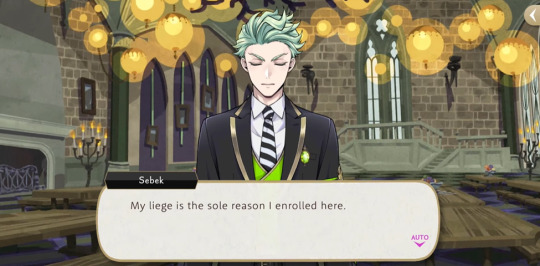
Though we’ve yet to learn just why he so fervently worships Malleus, perhaps we can trace this desire for his liege’s recognition back to a broader need to be affirmed of his worth. If you recall his despair at manifesting his magic so late, and how much it bothered him - hurt him, even - when Silver departed for NRC and left him behind, the great extent to which he values magical prowess is clear to see. And if we further consider how he so longs to separate himself from his human heritage – from his magicless heritage, could it be that, even more than the glory of knighthood, he simply yearns to find a part of himself that he – and all those around him – can be proud of, can find worth in?
For what is he without his magic? He, a mere half-blood, born amongst a peoples whose bodies thrum with a power more sacred, more ancient than the air within our lungs and the ground beneath our feet? I feel Sebek is so driven, so severe in his efforts to claim the right to stand by his liege’s side, just so that he one day might finally be able look himself in the mirror and say, “here, here is at least some part of me I don’t have to be ashamed of, that I don’t have to hate.”
And Silver, that sweet boy, how unerring, how remarkable is his selflessness, how his inexhaustible compassion belies the scant 17 years he’s spent awake on this earth! But when one pours out so much of oneself for others as he has done, when all that one does is for the sake of someone else, how often one loses sight of one’s own identity. Indeed, if I were to draw for you a map of the inside of Silver’s heart of hearts, if I were to plot for you his every dream, measure and record every aspect of his being, I scarcely doubt there’d be a single point you couldn’t trace back to his desire to make his father happy.
To that end, consider how we learned in Silver’s latest birthday vignette that Lilia began training him from an incredibly young age – when he had only just become conscious of his surroundings. A child that young cannot make such a monumental decision for himself - the decision must be made for the child. And so, we do not truly know if Silver’s dreams of knighthood are the result of his own personal meditations, or if his father, in his infinite folly, thrust them upon him, burdening the young child with an aspiration that would go on to consume nearly every facet of his life.
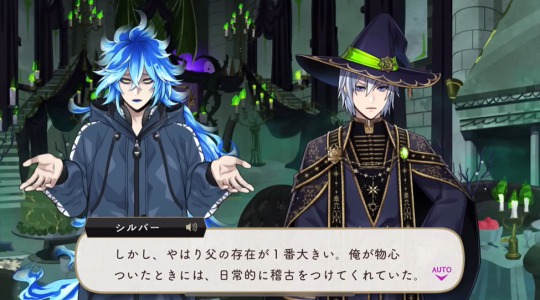
With the both of them being so unsure in their own identities, it's why I find it so poignant - and so apropos – that Sebek is the one to rouse Silver from his moments of self-doubt, time and time again. When Silver questioned his capabilities as a leader, when he wished desperately that he could change, that he could be more like his classmates, and when he, in his darkest hour, doubted even the sanctity of his father’s love for him – each and every time it was Sebek who liberated him from his great desolation.
It has to be Sebek - for who better to accompany Silver on his journey towards self discovery than one who must walk down the same path as he? Who better than his best friend, his brother, his reflection – his veritable light in the darkness of his own heart?

161 notes
·
View notes
Text
Last week’s spectacular OpenAI fight was reportedly a donnybrook between “Effective Altruism” and “Effective Accelarationism”—two schools of philosophy founded on the nonsensical faith, absent any evidence, that godlike artificial intelligence (AI) beings are imminent, and arguing over the best way to prepare for that day.
Cory Doctorow @mostlysignssomeportents :
This "AI debate" is pretty stupid, proceeding as it does from the foregone conclusion that adding compute power and data to the next-word-predictor program will eventually create a conscious being, which will then inevitably become a superbeing. This is a proposition akin to the idea that if we keep breeding faster and faster horses, we’ll get a locomotive….
But for people who don’t take any of this mystical nonsense about spontaneous consciousness arising from applied statistics seriously, these two sides are nearly indistinguishable, sharing as they do this extremely weird belief. The fact that they’ve split into warring factions on its particulars is less important than their unified belief in the certain coming of the paperclip-maximizing apocalypse….
Left out of this argument are the real abuses of artificial intelligence and automation today, which (Cory says, quoting Molly White) “is incredibly convenient for the powerful individuals and companies who stand to profit from AI.”
AI and automation can be used for a great deal of good and a great deal of evil—and it already is being used for both, Cory says. We need to focus the discussion on that.
Like Cory, I think it’s entirely possible that we may achieve human-level AI one day, and that AI might become superintelligent. That might happen today, it might happen in a thousand years, it might never happen at all. The human race has other things to worry about now.
111 notes
·
View notes
Text
Voiceless | Shadows of Betrayal
Tommy Shelby x Reader
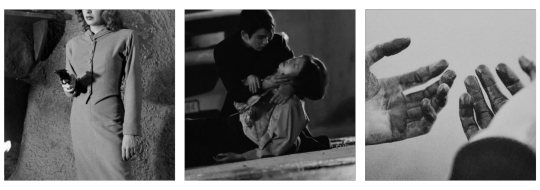
The evening draped Small Heath in an eerie stillness as the Shelby family gathered at the Garrison. Laughter and clinking glasses resonated from within, creating a facade of normalcy that veiled the impending darkness.
Amidst the warm glow of the streetlamps, Y/N decided to head to the Garrison ahead of Tommy. He was entangled in a crucial call, his voice carrying the weight of negotiations and alliances. Oblivious to the shadows closing in, Y/N stepped into the dimly lit streets, the familiar path from the betting shop to the Garrison now taking an ominous turn.
Grace, harboring a malevolent intent, materialized like a phantom in the alley. A concealed gun gleamed in her grasp as she approached Y/N, her eyes gleaming with twisted satisfaction.
"You stole everything from me," Grace hissed, her grip tightening on the gun. "Tommy, the attention, the admiration. You were nothing until he noticed you."
Panic surged through Y/N, her pace quickening into a desperate sprint. However, the alley transformed into a labyrinth, closing in on her as Grace swiftly closed the distance. The glint of the gun, a deafening shot, and searing pain erupted in Y/N's left shoulder, just above her heart. She crumpled to the ground, the cold pavement stained with her blood.
Unbeknownst to Grace, Tommy concluded his call, a mix of urgency and dread etched on his face. Oblivious to the unfolding tragedy, he hurried towards the Garrison, unaware that the shadows had descended upon Y/N.

As Y/N lay wounded, Grace reveled in her delusion. "You deserve this, Y/N. It would've been better if you had died the first time."
Tommy, alerted by the gunshot, hurried towards the scene. His eyes widened with horror as he found Y/N on the ground, clenching her shoulder in pain. Grace stood nearby, a twisted smile on her face as she uttered venomous words, proclaiming that Tommy should have been hers. "He should have been mine. He deserves to be with me."
Tommy, heart pounding, rushed to Y/N's side, his hands trembling as he tried to put pressure on her gunshot wound. The dim alley echoed with his desperate shouts for help, the air thick with a sense of impending tragedy.
Grace, in her delusional fervor, stood nearby, a twisted smile playing on her lips. "Tommy, leave her. She doesn't deserve you. Come with me, and we can start anew."
Tommy, appalled and furious, shot back, "You're fucking mad, Grace. Leave us alone!"
Y/N, caught in the throes of agony, fought to stay conscious. Each breath felt like a battle, the world around her fading in and out. Tommy, his panic escalating, continued to call for assistance, his voice strained and desperate.
The shadows deepened as the alley became a battleground of twisted desires and a fight for survival. Y/N, gasping for air, clung to consciousness, her strength waning with every passing moment.
Tommy, whose hands stained with Y/N's blood, refused to succumb to Grace's delusions, his loyalty unwavering.

The gunshot pierced the air, a dissonant note in the symphony of laughter and chatter within the Garrison. Customers, their revelry abruptly halted, exchanged alarmed glances.
Amidst the chaos, the familiar voice of Tommy Shelby shattered the uneasy stillness. "Help! Someone, help!"
The patrons, now unified by concern, rushed outside to find Tommy Shelby cradling a bloodied Y/N in his arms. Her face, pale and strained, bore the weight of pain and desperation.
"Hang in there, love. Help is on the way. Keep your eyes open for me," Tommy implored, his voice a mixture of reassurance and desperation.
Panic spread like wildfire, and the Shelby family, ever united, swiftly moved into action. Polly, the matriarch of the family, reacted instinctively. She rushed to Tommy's side, her sharp eyes assessing Y/N's injuries.
"John, get the car ready," Polly directed, her tone unwavering. "Ada, help keep pressure on the wound. Arthur, fetch some whiskey and clean sheets."
As the Shelby family orchestrated their roles, the onlookers were kept at bay, forming a respectful circle around the unfolding drama. The dimly lit streets bore witness to the Shelby family's unity in crisis.
Grace lingered nearby, whispering to her delusional pleas; attempting to pull Tommy away from the wounded Y/N.
The cold wind carried echoes of urgent footsteps, signaling John's return with the car. Ada, displaying a calm demeanor, worked alongside Polly, their synchronized efforts aimed at stabilizing Y/N until they could get her proper medical attention.
Meanwhile, Arthur, his usually boisterous nature subdued by the gravity of the situation, hurriedly returned with the requested supplies. The sharp smell of whiskey mingled with the tension in the air as Polly prepared to attempt rudimentary first aid.
Tommy, holding Y/N with a fierce protectiveness, felt a surge of gratitude for his family's swift response.

Masterlist | Previous Chapter | Next Chapter
#tommy shelby x reader#tommy shelby imagine#peaky blinders imagine#thomas shelby imagine#tommy shelby imagines#cillian murphy#peaky blinders imagines#thomas shelby imagines#peaky blinders#tommy shelby#peaky blinders fanfiction#peaky blinders fanfic#peaky blinder imagine#peaky blinder fanfic#peaky blinders x reader#peaky fucking blinders#thomas shelby fanfic#thomas shelby x reader#thomas shelby#thomas shelby angst#tommy shelby fanfic#tommy shelby angst#tommy shelby x you#cillian murphy x reader#cillian murphy imagine#cillian murphy fanfiction#cillian x reader
70 notes
·
View notes
Text
Tarot Symbolism in 1941
inspo: Three of Swords ask and answer by @embracing-the-ineffable
Okay guys this is outside my usual wheelhouse; I know just enough about tarot to be a nuisance. That said, once I saw the ask/answer above, I got to thinking about what other tarot symbolism might be in the S2E4 episode. "Nazi Zombie Flesheaters" was written by Jeremy Dyson and Andy Nyman, so it stands to reason this episode may contain unique elements not found elsewhere in the show.
I didn't analyze every suspect artifact, just the strong contenders. I'll demonstrate that whatever symbolism there may be directly pertains primarily to Aziraphale and to his relationship with Crowley. Below the cut we'll look at:
The Magician
The Chariot
Two of Coins
Ace of Coins
Three of Swords
Four of Swords
The Lovers
Two of Cups
Major Arcana
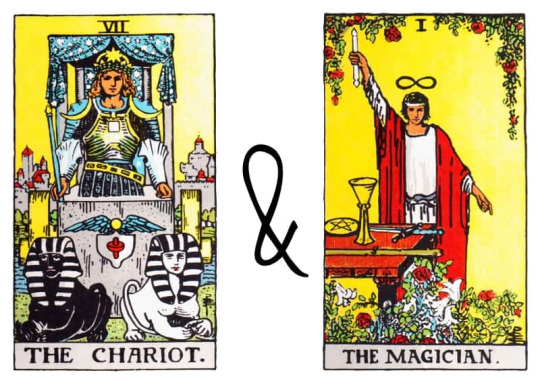
The Magician
First off may I just say that I am shocked and appalled that I have not come across a Fell the Marvelous magician tarot card. C'mon, artists of tumblr. Get it together.
This one is pretty obvious: Aziraphale is The Magician.
He has the ability to bridge the gap between heaven and earth and as such, he is capable of converting energy into matter.
The Magician is a card of manifestation: you want it so you make it happen. Aziraphale just grabbed this entire West End Stage situation by the horns and is steering it in the most ridiculous direction possible to show off for his knight in shining armor that just rescued him and his books.
Aziraphale manifests reality even when the miracle blocker is active: the bullet misses, and his notoriously unreliable sleight of hand works when he five-finger discounts Furfur's damning evidence.
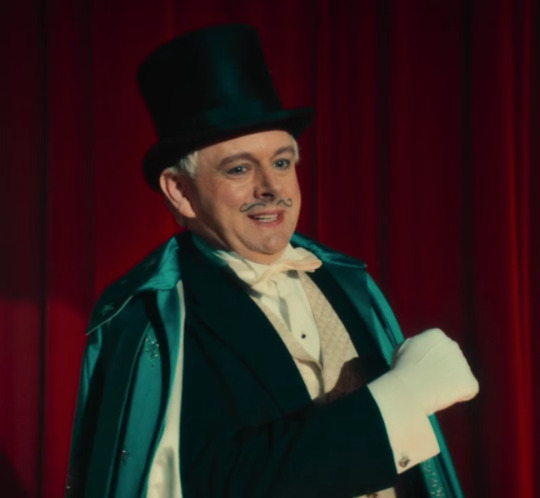
Aziraphale is feeling his oats in this episode, and approaches every new challenge with the absolute and unwavering conviction that he can overcome it, and seemingly through sheer willpower, he does.
The magician is typically represented with all four symbols of power: a wand, a sword, a cup, and a coin (pentacle). This represents a high level of resourcefulness and adaptability, underlaid by the knowledge and skills necessary to deploy those tools.
The magician is a dangerous character, a boon to his allies and a threat to his enemies, but sometimes wields more power than wisdom. The magician has more ability to get what he wants than to necessarily know what is good for him.
The Chariot
This isn't symbolically referenced in 1941 per se but like I said, I have just enough knowledge of Tarot to be a nuisance and the symbolism was already there throughout the show so why not talk about it here.
This card depicts a black entity and a white entity (sometimes horses, sometimes sphynxes, depending on your deck) pulling a chariot. But the white thing and the black thing tend to be pulling in different directions, working against each other instead of with each other because they have different ideas about where the chariot they are both yoked to should be going:
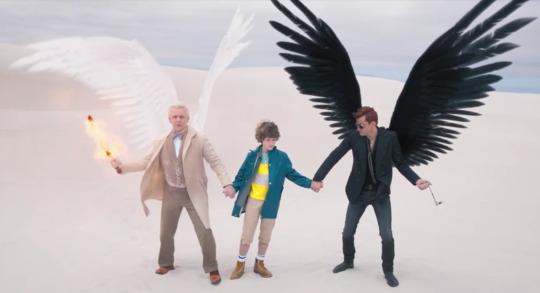
It's rather inefficient.
And if that isn't a metaphor for Aziraphale and Crowley's influences on humanity and Earth, or the progress of their own relationship, I don't know what is.
But more generally, the Chariot represents the warring [internal] influences on the singular charioteer; their masculine and feminine aspects, their conscious and unconscious desires, etc. The message of the card is that the charioteer must define their goals so they can steer their powerful steeds in a single direction.
Much in this same way, Aziraphale [in the role of charioteer] is being pulled in opposite directions by his loyalty to Heaven and his conviction that Crowley is morally righteous. The challenge he faces is in unifying these beliefs.
The Magician & the Chariot
Where once there was one, now there are two; with the magician representing power and the chariot representing the unification of direction and purpose, the holistic effect is an incredibly powerful combination that can accomplish anything. Now that Crowley and Aziraphale have hitched themselves to the same cart, they will be unstoppable so long as they stick together and keep moving toward the same goal.
In the context of Aziraphale as the charioteer, however, the interpretation feels a bit more dire; there is great strength behind the forces that pull him in opposite directions, which now threaten to tear him in two. His ability to manifest has no clear direction.
Coins

Two of Coins (Pentacles)
Back at the bookshop, Aziraphale presents a sixpence and a farthing in the palm of his hand as part of a magic trick.
The Two of Coins is generally depicted as a juggler; like the chariot, this represents unsteadiness and conflict that needs to be resolved. The juggler is juggling multiple influences, trying to find balance and struggling to prioritize. It can indicate he is not giving enough of his energy to his romantic partner.
Ace of Coins (Pentacles)
After Aziraphale recites the magic words (and again, shocked and appalled that no one has done a meta on "banana fish gorilla shoelace with a dash of nutmeg," I mean are we meta-analysts or aren't we?) and the farthing has vanished, symbolically resolving the tension of duality:

The Ace of Coins (Pentacles), in the context of romance, represents a fresh start with a person who will provide stability: a knight in shining armor who arrives and provides a sense of security. It can represent a new beginning or a strengthening bond within an existing relationship.
If you have been considering taking your relationship to the next level, [the ace of coins] can also serve as a good omen.
I'm not even kidding, that's a straight quote from the source text.
Two of Coins -> Ace of Coins
Within this magic trick we have a symbolic transition from relational instability to stability, from unresolved romantic tension to a fresh start and strong bonding. If the magic trick is representative of Aziraphale and Crowley's relationship, this transition is a sign that they are coming closer together and starting a new chapter of their romance.

Three of Swords
Taken directly from the inspo; in the magic shop, as they are discussing the bullet catch, Aziraphale is standing in front of the Excalibur chest. Three swords emerge from the right side, and appear to be piercing his spine. The most direct imagery correlation is with this version of the Three of Swords:
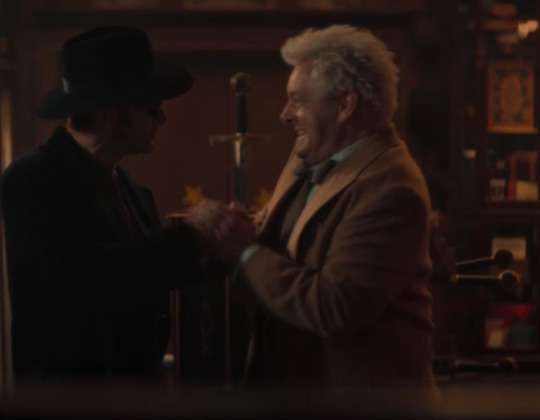
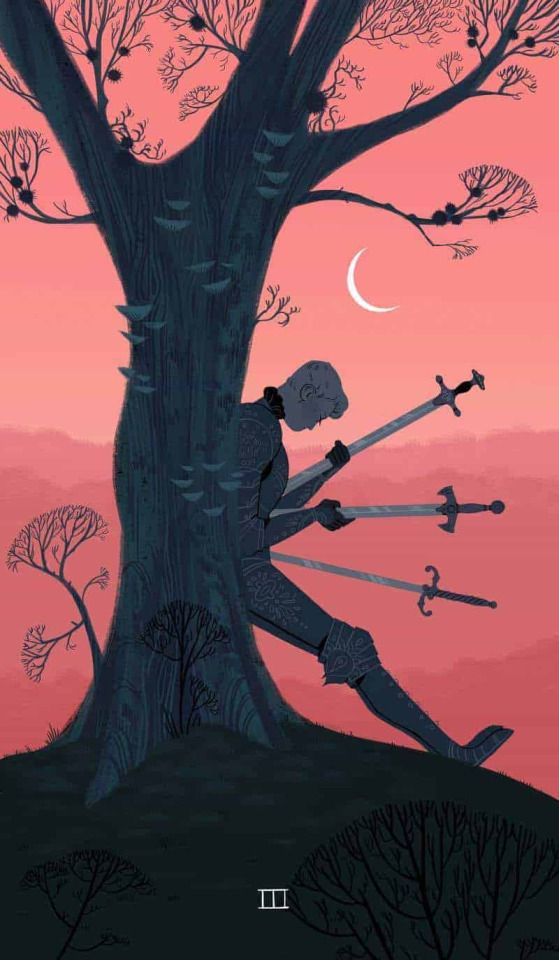
The Upright Three of Swords signifies a sudden and unexpected blow to your emotions. When you see this card in a reading, it often foretells the sudden loss of a loved one, the realization of betrayal, or the end of an important relationship with someone you loved very much.
This accurately represents how Aziraphale felt the last time they saw each other, following the holy water request in St. James' Park.

At the end of this scene, Aziraphale disavows their "fraternity" and stalks off in a huff. Crowley makes no attempt to stop him. Clearly, neither of them expected the conversation to go this way, and each feels betrayed by the other.
Three of Swords & The Magician
When this duo appears in a reading, a breakdown in communication is causing serious issues.
During the entirety of S2E4, Aziraphale rushes boldly forward without duly considering Crowley's objections; by the same token, Crowley is also not being honest about his limitations. The "serious issue" that this causes is Crowley almost shooting Aziraphale in the face, a situation they would not be in if Aziraphale had not been so bull-headed about performing a dangerous and unfamiliar show-stopping trick.
Their relationship has barely been rekindled and has not had time to heal from the damage done in St. James' Park; it is too fragile for them to speak honestly with each other, and Aziraphale, fired up by egoistic fervor, charges boldly ahead with minimal regard for the consequences.
Suffice to say, this is some on-the-nose symbolism.
Four of Swords
When Aziraphale shakes Crowley's hand, he brings his hand up uncomfortably high to chest height, which seems like an odd choice until you realize that he has to do that in order to get his hand lined up perfectly between the aperture of the camera and the sword that sticks up from the Excalibur Chest. The three swords still emerge from his back, so Aziraphale is now the focal point of four swords. Additionally, the arrangement of the swords is in keeping with the general depiction of the tarot card; one sword is in his control/possession, three are not.
The Four of Swords is a symbol of chaos. It warns the subject that they are overwhelmed, overstimulated, out of touch:

- Haven't you fired a gun before? - Not as such.
...and needs to retreat and rest.
In romance, it can indicate that a rocky relationship is stabilizing and returning to normal. But it can also portent new issues that will make or break the relationship. One way or another, it is indicative of relational stress that needs to be resolved.
Four of Swords & The Magician
The combination with the Magician foreshadows a long-term relationship in your future. The key interpretation of the Four of Swords in this combo is that building yourself as a person first will attract the right partner.
Aziraphale (the Magician in question) has a lot of self-work to do resolving his attitudes about Good and Evil in order to be a good partner for Crowley, but if he can do it, the Four of Swords symbolism in this scene is a positive portent for their relationship.
Three of Swords -> Four of Swords
The transition from the Three of Swords to Four of Swords seems to indicate that a relationship broken by bad communication is starting to heal; it is not completely repaired, and there is still work to be done, but they have taken the first step. But it may also indicate that Aziraphale has bitten off more than he can chew and has introduced chaos into the relationship in his attempt to repair it.
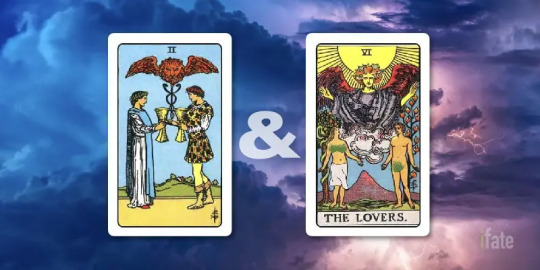
The Lovers
We can't talk about Tarot without talking about the Lovers. Well, we could, but I'd get a lot of comments about it. The romantic candlelit scene invokes an image of lovers, so I'm running with it.
This card is rich with relevant symbolism and deserves its own meta from anyone who wants to do it. I will only briefly discuss it here insofar as it is directly relevant to the S2E4 depiction of events that occurred in 1941.
The upright Lovers tarot card can imply that you have major life-changing choices or are faced with a dilemma. Temptation is often part of that choice or dilemma.
Aziraphale constantly oscillates between the side of Heaven and the Third Side, but the events at the church have swung the needle and imbued our angel with a renewed sense of allegiance to his demonic companion. But this only serves to make things more complicated; no sooner is the flame of romance reignited than Furfur shows up to threaten Crowley, using their association as evidence against him. Miraculous escape notwithstanding, the danger of the situation is apparent. Aziraphale is aware that he may soon have to make some tough choices about who's side he's really on.
Two of Cups
The Two of Cups tarot card is one of the most positive relationship cards in the deck. When you pull this card in a reading, it stands for harmony, togetherness, and working as a team to build a strong partnership.
The Two of Cups is arguably more about love than The Lovers. This card indicates that the subject is in a deeply intimate, supportive romantic relationship. It serves to confirm that they've found The One.
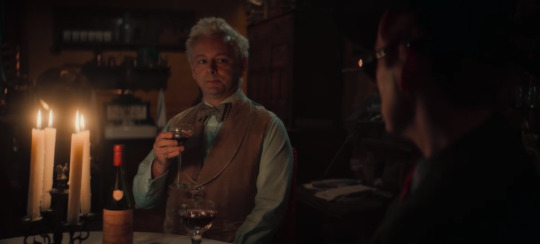
The Magician & Two of Cups
...your new lover won’t be someone new at all, but a friend you already know well.
With the combined symbolism of Fell the Marvelous and the two glasses of wine at the end of the night, we have some holistic tarot symbolism that these two friends that go back a long time are, well... soulmates.
IN SUMMARY
I have no idea how much Jeremy Dyson and Andy Nyman, or by extension Neil Gaiman and John Finnemore, are into tarot, but it's a show about angels and demons and the episode features homoerotic magic tricks and Nazi zombies, so, you know... it wouldn't be the weirdest thing they've done to include some tarot symbolism.
This was a fun meta to write and if you enjoyed it please say so; if anyone would like me to do a deep dive into the Lovers card, let me know, and I'll put some energy into it the next time I feel like neglecting meatspace responsibilities.
If you enjoyed this meta, you may enjoy Why Aziraphale Wears Spectacles or, if you want to see my full catalog of metas, you can check out indigovigilance original content (metas)
127 notes
·
View notes
Text
“In physics, a unified field theory (UFT) is a type of field theory that allows all that is usually thought of as fundamental forces and elementary particles to be written in terms of a pair of physical and virtual fields. According to the modern discoveries in physics, forces are not transmitted directly between interacting objects but instead are described and interpreted by intermediary entities called fields.”
#quote of the day#physics#science#unified field#quotes#energy#consciousness#subconscious#self conscious#self awareness#awareness#self realization#คำคม
0 notes
Text
it's a tragically common pattern among fgo players (and i'm sure many other series too but type moon is my house) that they'll see a design that deviates from what I'll unfairly generalise here as "common anime style" and immediately dismiss it as ugly. i just mentioned oberon but limbo is another example, a lot of people hated and still hate limbo for being "ugly" and a lot of the ones who don't anymore only turned around because of their fourth ascension. they're not ugly they just have an eccentric and unconventional design, one that the artist blatantly put an incredible amount of thought and care into. i've seen people call nightingale's art ugly. I've seen people call quetzalcoatl's art ugly. it's not, it just doesn't look like fucking genshin.
it's a shame because not going for a unified artstyle like idk love live or granblue (the only two mobile games off the top of my head that were relevant at the time of initial fgo development) was a conscious decision that, when you look at things like how epic of remnant was all guest writers with minimal supervision, or just the way nasu talks about his fellow creatives in interviews, was pretty clearly because he wanted to show off all these different artists that he loves. fgo is very deliberately a collaborative effort and artist showcase and maybe this is just a hashtag artist opinion of me but i think you're missing out on a lot if you're unable to deal with a game occasionally having a character in a slightly more unusual artstyle.
i feel like it's related to the more general dissonance between what fgo and fate in general are perceived as versus what they're actually like. it's got a titty game reputation so people who came in expecting generic titty game feel betrayed when it's like. not generic. it's definitely titty though. but like you know how the impression reddit gives you of every single fgo character is some generic waifushit trope and then when you look at her actual characterisation there's literally always something interesting going on? for some reason a lot of fgo players just hate when it does something interesting.
199 notes
·
View notes
Text


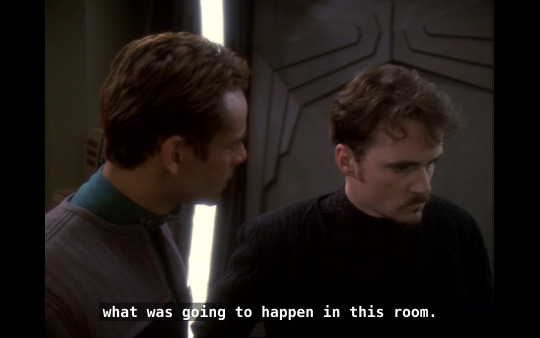
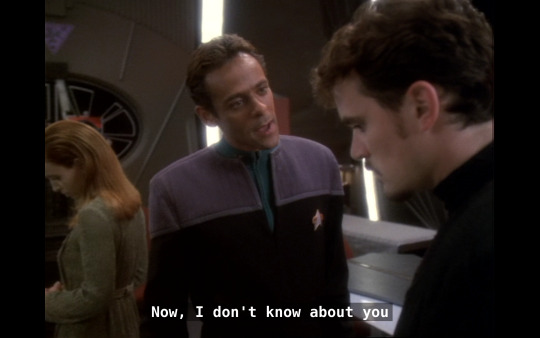

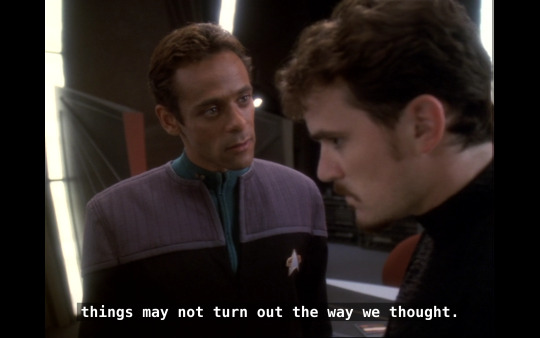
in answer to despair, julian figures out that he cannot possibly know everything. what a comfort, to be as smart as that and to finally allow yourself to acknowledge the simplest truth of intellect: that it is essentially limited. and to exist in the either/or place, this discomforting reality where one cannot know the right answer, where one can only know that being 'certain' is the wrong answer, where vulnerability is the unifying factor for conscious life, where "not even the very wise know all ends..." (there's also something in this episode that speaks really clearly to people who have given over to some idea of utter ruin via climate change: the need to stop pretending like you are smarter than the world you are living in.)
78 notes
·
View notes
Note
I still don't understand the important thing that Bakugou will do for the story. In many ways, Ochako took on such important roles that she changed society. She connected heroes with civilians. Now she will connected civilians with villians. Like with Deku and shoto. What about Bakugou? I still don't understand what is special about him, what can happen that will affect the story and the society. And I'm sorry for my English. I'm bad at this.
I'm not sure I fully understand what you're saying about Ochako's role. I don't see how Ochako's (or Izuku's, or Shouto's) role in the current arc is about civilians (or at least not yet).
But I have two answers to your question.
I would actually be excited to be you. You don't see where Katsuki's story is going right now, and that means you are more likely to figure it out right when Katsuki's character arc concludes. That timing would be so rewarding to understand the story. You don't HAVE to understand it yet. It's not complete!
To me, all the characters make up a piece of the overall story. If the overall story is about a societal shift from one way of thinking about heroes and villains to a new way, then Izuku's piece is about heroes needing to SAVE villains, Shouto's piece is about recognizing one's humanity before their quirk, Ochako's piece is about changing the mindsets of the civilians (and in the most recent arc about connecting with the villains kinda like how Izuku may do), Tenya's piece is about determining which parts of society's rules to uphold and which to break, and Katsuki's piece is about changing how heroes operate. So Izuku addresses villains, Shouto addresses humanity vs quirk, Ochako addresses civilians, Tenya addresses social expectations and rules, and Katsuki addresses heroes.
Katsuki's character arc has been about a boy who wanted to be the Number One Hero, the greatest ever, by himself--and how his vision of "Number One" changes into a leader who values teamwork and treats the "whole" as stronger than the sum of its parts. "All For One" and "One For All" and all that.
His story began in chapter 1 when all the heroes who were supposed to save him wouldn't do so. He saw heroism in Izuku (which made him self-conscious) where no one else did until All Might came along. He spends the whole story coming to terms with how he had one image of heroism that doesn't hold up in the face of All Might's heroism, Izuku's heroism, what heroism truly is. He regrets his weakness that he believes led to All Might's downfall. He tries to learn and change to become a stronger hero so he never lets anything like that happen again. He learns about rescue and sacrifice. He becomes a charismatic, unifying leader. He brings the whole class together to bring Izuku home. He rallied all the heroes at the UA battlefield to face TomurAFO without Izuku. He credited everyone behind the scenes for helping them have a shot at stopping TomurAFO. He rejected TomurAFO's philosophizing with insight and experience. He is the evidence that society can change, that things aren't as hopeless as TomurAFO makes them seem. Katsuki is uniting heroes to be BETTER than they have been in the past.

So yeah. From my point of view, Katsuki is addressing the problems with HEROES. He's making heroes be actual heroes.
#anon ask#ask pika#my hero academia manga spoilers#final showdown spoilers#katsuki bakugou#meta#alluratron
77 notes
·
View notes
Text
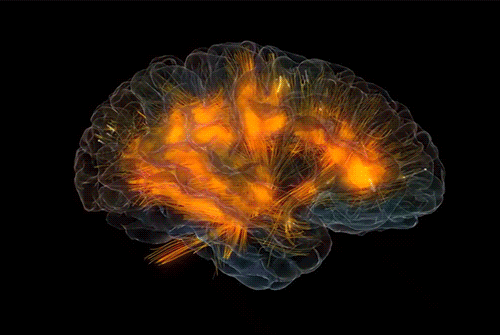
Is the Brain a Driver or a Steering Wheel?
This three part series summarizes what science knows, or thinks it knows, about consciousness. In Part 1 What Does Quantum Physics Imply About Consciousness? we looked at why several giants in quantum physics - Schrodinger, Heisenberg, Von Neumann and others - believed consciousness is fundamental to reality. In Part 2 Where Does Consciousness Come From? we learned the "dirty little secret" of neuroscience: it still hasn't got a clue how electrical activity in the brain results in consciousness.
In this concluding part of the series we will look at how a person can have a vivid conscious experience even when their brain is highly dysfunctional. These medically documented oddities challenge the materialist view that the brain produces consciousness.
Before proceeding, let's be clear what what is meant by "consciousness". For brevity, we'll keep things simple. One way of looking at consciousness is from the perspective of an outside observer (e.g., "conscious organisms use their senses to notice differences in their environment and act on their goals.") This outside-looking-in view is called behavioral consciousness (aka psychological consciousness). The other way of looking at it is the familiar first-person perspective of what it feels like to exist; this inside-looking-out view is called phenomenal consciousness (Barušs, 2023). This series is only discussing phenomenal consciousness.
Ready? Let’s go!

Source: Caltech Brain Imaging Center
A Hole in the Head
Epilepsy is a terrible disease in which electrical storms in the brain trigger seizures. For some people these seizures are so prolonged and frequent that drastic action is needed to save their lives. One such procedure is called a hemispherectomy, the removal or disconnection of half the brain. Above is an MRI image of a child who has undergone the procedure.
You might think that such radical surgery would profoundly alter the memory, personality, and cognitive abilities of the patient.
You would be wrong. One child who underwent the procedure at age 5 went on to attend college and graduate school, demonstrating above average intelligence and language abilities despite removal of the left hemisphere (the zone of the brain typically identified with language.) A study of 58 children from 1968 to 1996 found no significant long-term effects on memory, personality or humor, and minimal changes in cognitive function after hemispherectomy.
You might think that, at best, only a child could successfully undergo this procedure. Surely such surgery would kill an adult?
You would be wrong again. Consider the case of Ahad Israfil, an adult who suffered an accidental gunshot to the head and successfully underwent the procedure to remove his right cerebral hemisphere. Amazingly, after the five hour operation he tried to speak and went on to regain a large measure of functionality (although he did require use of a wheelchair afterwards.)
Another radical epilepsy procedure, a corpus collosotomy, leaves the hemispheres intact but severs the connections between them. For decades it was believed that these split-brain patients developed divided consciousness, but more recent research disputes this notion. Researchers found that, despite physically blocking all neuronal communication between the two hemispheres, the brain somehow still maintains a single unified consciousness. How it manages this feat remains a complete mystery. Recent research on how psychedelic drugs affect the brain hints that the brain might have methods other than biochemical agents for internal communication, although as yet we haven't an inkling as to what those might be.
So what's the smallest scrape of brain you need to live? Consider the case of a 44-year-old white collar worker, married with two children and with an IQ of 75. Two weeks after noticing some mild weakness in one leg the man went to see his doctor. The doc ordered a routine MRI scan of the man's cranium, and this is what it showed.

Source: The Lancet
What you are seeing here is a giant empty cavity where most of the patient's brain should be. Fully three quarters of his brain volume is missing, most likely due to a bout of hydrocephalus he experienced when he was six months old.

Last Words
Many unusual phenomena have been observed as life draws to an end. We're going to look at two deathbed anomalies that have neurological implications.
The first is terminal lucidity, sometimes called paradoxical lucidity. First studied in 2009, terminal lucidity refers to the spontaneous return of lucid communication in patients who were no longer thought to be medically capable of normal verbal communication due to irreversible neurological deterioration (e.g., Alzheimers, meningitis, Parkinson's, strokes.) Here are three examples:
A 78-year-old woman, left severely disabled and unable to speak by a stroke, spoke coherently for the first time in two years by asking her daughter and caregiver to take her home. She died later that evening.
A 92-year-old woman with advanced Alzheimer’s disease hadn’t recognized her family for years, but the day before her death, she had a pleasantly bright conversation with them, recalling everyone’s name. She was even aware of her own age and where she’d been living all this time.
A young man suffering from AIDS-related dementia and blinded by the disease who regained both his lucidity and apparently his eyesight as well to say farewell to his boyfriend and caregiver the day before his death.
Terminal lucidity has been reported for centuries. A historical review found 83 case reports spanning the past 250 years. It was much more commonly reported in the 19th Century (as a sign that death was near, not as a phenomenon in its own right) before the materialist bias in the medical profession caused a chilling effect during the 20th Century. Only during the past 15 years has any systematic effort been made to study this medical anomaly. As a data point on its possible prevalence a survey of 45 Canadian palliative caregivers found that 33% of them had witnessed at least one case of terminal lucidity within the past year. Other surveys found have that the rate of prevalence is higher if measured over a longer time window than one year, suggesting that, while uncommon, terminal lucidity isn't particularly rare.
Terminal lucidity is difficult to study, in part because of ethical challenges in obtaining consent from neurocompromised individuals, and in part because its recent identification as a research topic presents delineation problems. However, the promise of identifying new neurological pathways in the brains of Alzheimer's and Parkinson's patients has gotten a lot of attention. In 2018 the US National Institute on Aging (NIA) announced two funding opportunites to advance this nascent science.
Due to the newness of this topic there will continue be challenges with the data for some time to come. However, its impact on eyewitnesses is indisputably profound.
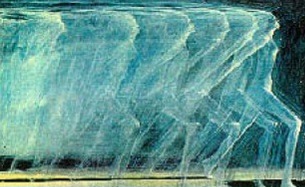
Near Death Experiences
The second deathbed anomaly we will take a look at are Near-Death Experiences (NDEs.) These are extraordinary and deeply personal psychological experiences that typically (but not always) occur during life-threatening emergencies such as cardiac arrest, falls, automobile accidents, or other traumatic events; they are also occasionally reported during general anesthesia. Much of the research in this area has focused on cardiac arrest cases because these patients are unconscious and have little to no EEG brain wave activity, making it difficult to account for how the brain could sustain the electrical activity needed to perceive and remember the NDE. This makes NDEs an important edge case for consciousness science.
NDEs are surprisingly common. A 2011 study published by the New York Academy of Sciences estimated that over 9 million people in the United States have experienced an NDE. Multiple studies have found that around 17% of cardiac arrest survivors report an NDE.
There is a remarkable consistency across NDE cases, with experiencers typically reporting one or more of the following:
The sensation of floating above their bodies watching resuscitation efforts, sometimes able to recall details of medical procedures and ER/hallway conversations they should not have been aware of;
Heightened sensations, occasionally including the ability of blind and deaf people to see and hear;
Extremely rapid mental processing;
The perception of passing through something like a tunnel;
A hyper-vivid life review, described by many experiencers as "more real than real";
Transcendent visions of an afterlife;
Encounters with deceased loved ones, sometimes including people the experiencer didn’t know were dead; and
Encounters with spiritual entities, sometimes in contradiction to their personal belief systems.
Of particular interest is a type of NDE called a veridical NDE. These are NDEs in which the experiencer describes events that occurred during the period when they had minimal or no brain activity and should not have been perceived or remembered if the brain were the source of phenomenal consciousness. These represent about 48% of all NDE accounts (Greyson 2010). Here are a few first-hand NDE reports.
A 62-year-old aircraft mechanic during a cardiac arrest (from Sabom 1982, pp. 35, 37)
A 23-year-old crash-rescue firefighter in the USAF caught by a powerful explosion from a crashed B-52 (from Greyson 2021, pg. 27-29)
An 18-year-old boy describes what it was like to nearly drown (from the IANDS website)
There are thousands more first person NDE accounts published by the International Association for Near-Death Studies and at the NDE Research Foundation. The reason so many NDE accounts exist is because the experience is so profound that survivors often feel compelled to write as a coping method. Multiple studies have found that NDEs are more often than not life-changing events.
A full discussion of NDEs is beyond the scope of this post. For a good general introduction, I highly recommend After: What Near-Death Experiences Reveal about Life and Beyond by Bruce Greyson, MD (2021).

The Materialist Response
Materialists have offered up a number of psychological and physiological models for NDEs, but none of them fits all the data. These include:
People's overactive imaginations. Sabom (1982) was a skeptical cardiologist who set out to prove this hypothesis by asking cardiac arrest survivors who did not experience NDEs to imagine how the resuscitation process worked, then comparing those accounts with the veridical NDE accounts. He found that the veridical NDE accounts were highly accurate (0% errors), whereas 87% of the imagined resuscitation procedures contained at least one major error. Sabom became convinced that NDEs are real. His findings were replicated by Holden and Joesten (1990) and Sartori (2008) who reviewed veridical NDE accounts in hospital settings (n = 93) and found them to be 92% completely accurate, 6% partially accurate, and 1% completely inaccurate.
NDEs are just hallucinations or seizures. The problem here is that hallucinations and seizures are phenomena with well-defined clinical features that do not match those of NDEs. Hallucinations are not accurate descriptions of verifiable events, but veridical NDEs are.
NDEs are the result of electrical activity in the dying brain. The EEGs of experiencers in cardiac arrest show that no well-defined electrical activity was occurring that could have supported the formation or retention of memories during the NDE. These people were unconscious and should not have remembered anything.
NDEs are the product of dream-like or REM activity. Problem: many NDEs occur under general anesthesia, which suppresses dreams and REM activity. So this explanation cannot be correct.
NDEs result from decreased oxygen levels in the brain. Two problems here: 1) The medical effects of oxygen deprivation are well known, and they do not match the clinical presentation of NDEs. 2) The oxygen levels of people in NDEs (e.g., during general anesthesia) has been shown to be the same or greater than people who didn’t experience NDEs.
NDEs are the side effects of medications or chemicals produced in the brain (e.g. ketamine or DMT). The problem here is that people who are given medications in hospital settings tend to report fewer NDEs, not more; and drugs like ketamine have known effects that are not observed in NDEs. The leading advocate for the ketamine model conceded after years of research that ketamine does not produce NDEs (Corraza and Schifano, 2010).

Summing Up
In coming to the end of this series, let's sum up what we discussed.
Consciousness might be wired into the physical universe at fundamental level, as an integral part of quantum mechanics. Certainly several leading figures in physics thought so - Schrodinger, Heisenberg, Von Neumann, and more recently Nobel Laureate Roger Penrose and Henry Stapp.
Materialist propaganda notwithstanding, neuroscience is no closer to identifying Neural Correlates of Consciousness (NCCs) than it was when it started. The source of consciousness remains one of the greatest mysteries in science.
Meanwhile, medical evidence continues to pile up that there is something deeply amiss with the materialist belief that consciousness is produced by the brain. In a sense, the challenge that NDEs and Terminal Lucidity pose to consciousness science is analogous to the challenge that Dark Matter poses to physics, in that they suggest that the mind-brain identity model of classic materialist psychology may need to be rethought to adequately explain these phenomena.
Ever since the Greeks, science has sought to explain nature entirely in physical terms, without invoking theism. It has been spectacularly successful - particularly in the physical sciences - but at the cost of excluding consciousness along with the gods (Nagel, 2012). What I have tried to do in this series is to show that a very credible argument can be made that materialism has the arrow of causality backwards: the brain is not the driver of consciousness, it's the steering wheel.
I don't think we are yet ready to say what consciousness is. Much more research is needed. I'm not making the case for panpsychism, for instance - but I do think consciousness researchers need to throw off the assumption drag of materialism before they're going to make any real progress.
It will be up to you, the scientists of tomorrow, to make those discoveries. That's why I'm posting this to Tumblr rather than an academic journal; young people need to hear what's being discovered, and the opportunities that these discoveries represent for up and coming scientists.
Never has Planck's Principle been more apt: science advances one funeral at a time.
Good luck.
For Further Reading
Barušs, Imants & Mossbridge, Julia (2017). Transcendent Mind: Rethinking the Science of Consciousness. American Psychological Association, Washington DC.
Barušs, Imants (2023). Death as an Altered State of Consciousness: A Scientific Approach. American Psychological Association, Washington DC.
Batthyány, Alexander (2023). Threshold: Terminal Lucidity and the Border of Life and Death. St. Martin's Essentials, New York.
Becker, Carl B. (1993). Paranormal Experience and Survival of Death. State University of New York Press, Albany NY.
Greyson, Bruce (2021). After: A Doctor Explores What Near-Death Experiences Reveal about Life and Beyond. St. Martin's Essentials, New York.
Kelly, Edward F.; Kelly, Emily Williams; Crabtree, Adam; Gauld, Alan; Grosso, Michael; & Greyson, Bruce (2007). Irreducible Mind: Toward a Psychology for the 21st Century. Rowman & Littlefield, New York.
Moody, Raymond (1975). Life After Life. Bantam/Mockingbird, Covington GA.
Moreira-Almeida, Alexander; de Abreu Costa, Marianna; & Coelho, Humberto S. (2022). Science of Life After Death. Springer Briefs in Psychology, Cham Switzerland.
Penfield, Wilder (1975). Mystery of the Mind: A Critical Study of Consciousness and the Human Brain. Princeton Legacy Library, Princeton NJ.
Sabom, Michael (1982). Recollections of Death: A Medical Investigation. Harper and Row Publishers, New York.
van Lommel, Pim (2010). Consciousness Beyond Life: The Science of the Near-Death Experience. HarperCollins, New York.
#consciousness#cognitive science#near death experiences#nde#terminal lucidity#terminal illness#cognitive neuroscience#paradoxical lucidity#hemispherectomy#corpus collosotomy#psychadelic#psychonaut#psychonauts#psilocybin#lsd#ketamine#materialism and its discontents#neurology#neuropsychology#philosophy of mind#brain#quantum physics#consciousness series
51 notes
·
View notes
Text
The ofmd season 2 finale makes sense to me for Ed's character because his journey is not about transformation, and it's not about leaving behind the parts of yourself that you hate and fill you with shame and scare you. It's not about becoming morally good, or even about becoming morally better, necessarily. It's about integration--integrating the contradictory parts of ourselves into a unified whole.
We all have contradictions in ourselves, and Ed has them galore. He's soft, and he's scary. He's sensitive, and he's heartless. And traditionally he's given the shadow parts of himself the name of Blackbeard. And he's called the soft sensitive parts of himself Ed.
But the thing is, all of those things are Ed. And he has to decide what to do with them. His impulse in 2.7 is to throw away Blackbeard, to throw away his leathers, to throw away the pirating life, to throw away anything that is ugly and imperfect and scary about himself.
He loves the soft, sensitive, aware, appreciative part of himself. He wishes that was *all* he was. But in the finale, he realizes that's not working. Because he's also impatient and distractible and self-centered and used to other people doing the dirty work. Before, they did the dirty work of killing people for him. Now, they do the dirty work of fishing and hauling and cleaning and repairing nets and everything else.
If he's going to stay with the fishermen, he's going to have to do the dirty work of being a fisherman. And sure, when PopPop tells him to go find something he's good at, maybe that's derisive and mean, and maybe it sent Ed into a bit of a tailspin. A lot of people think it did.
But I don't think that's all it did. I think it got Ed thinking. He wasn't willing to do the dirty work of fishing. And he knew how to pirate, but he was ambivalent about doing the dirty work of that--had always been. Was there a way to live a life without dirty work? Because that's what he wanted.
And I like to think that somewhere on his magic rowboat ride, he realized that life *is* dirty work ("life's a dick"). Whether he's a fisherman or a pirate or something else, the job will always require dirty work. He will always have to do dirty work. What he needs to decide is how dirty, and what kind of dirty, and will it be a dirty that he's good at or bad at, that harms him or helps him, that builds community or tears it apart.
Maybe he didn't have that realization. It doesn't matter, because when he gets to the pirate island and he thinks Stede's very possibly hurt or dead, he makes the decision to do the dirty work himself, and for what purpose. And it's probably not a completely conscious decision at first, to kill those two soldiers in the boat. But it's a decision, and it's a decision that signals a change in Ed.
Because previously, when he went ballistic, he went ballistic on his crew, on the people close to him. He hurt the people close to him because that was a way to hurt himself, to remind himself that he was a bad person, to remind himself that he was dangerous to the people close to him, because he had murdered his father, and that made him a bad person, and he wanted to punish himself by constantly reopening the wound he had experienced by killing his father, even though killing his father may have been the most moral option out of the options he had for dealing with that situation. The outside world thought that he was attacking the rich, the merchants, the empire. But Ed was on a suicide mission. He was trying to get the attention of Ned so that Ned would come and kill him and possibly his entire crew, who he saw as parts of himself. (Storywise if not psychologically speaking, he forced his crew to kill people as a way of displacing his trauma onto them, and of making them deserving to die with him.)
Which is to say, previously, when he's gone ballistic, he's gone ballistic on *himself*, and any deaths and injuries and mayhem were just collateral damage in that war. But the soldiers Ed kills when he returns to the island aren't collateral damage on the war he has against himself. He's fighting against them and what they represent--a navy and an empire that has hurt (and he fears may have killed) Stede.
But what's even more important is what he's fighting *for.* Because that's a totally new thing, and fighting *for* something.
He's fighting for Stede and for himself and for the life and love he thought he didn't want when he was stuck in the Gravy Bowl.
In real life, murder and killing are horrible tragedies. In fiction, they are useful narrative devices. In OFMD, killing can be a sign of depravity, and/or it can be hilarious, and/or it can be a means of liberation. If killing can be so many things within the story, I think it can also be many different things for Ed: it doesn't always have to be Ed harming himself; it doesn't always have to be morally gray.
Ed is integrating the sunny and shadow sides of himself into a whole person working toward a united goal. He can be soft and tender and tell Stede, "I love you. I love you." He can be violent and wreak death. But he does it in service of one thing: his love for Stede, and the family he doesn't yet recognize as his own, and the life (as in the fact of living, not any particular lifestyle) he didn't think he wanted. ("Die, motherfuckers." "For love!")
Ed is everything he ever has been. He hasn't changed. He's still imperfect and impulsive and, yes, violent. And yet he has changed so much. He's no longer trying to destroy himself, and he's no longer interested in inflicting violence (directly or vicariously) on others for no good reason except that he's bored and hates himself.
And when he makes a decision to open up a little inn on the edge of the island, it's sort of impulsive, but it also isn't. It's something he's played around with in his head for a long time, as we learned in the Gravy Bowl. And unlike with many of his previous impulsive acts, he's not using it to run away from himself or anyone or anything else. It's an attempt to work on his relationship with Stede, and to find out if he can stomach the daily dirty work of running an inn, and maybe even to learn how to not be a dick to his customers. (And this post is mostly about Ed but don't worry about Stede here and how he's abandoning his lifelong dream of living out on the open seas as a pirate--because was that his dream, or was it a manifestation of his deeper dream, which was to break free of the heteronormative prison he was trapped in? Well, he can do that at the inn, too.)
TL;DR For me, the narrative is cohesive. It makes sense. The story was never about how killing his father turned Ed into a monster. It was never attempting to set up the expectation that if Ed resumed killing people with his own hands, it would be an obstacle to his healing and growth. The story was about how Ed's reaction to killing his father--his interpretation of the events and how they had changed him--his belief that he was a fundamentally bad person and unworthy of love--distanced him from others and turned him into Blackbeard. And this season was about how accepting love made him able to accept that he wasn't fundamentally bad; and being fundamentally good isn't a requirement for healing or being loved.
#edward teach#ofmd#ofmd season 2#ofmd s2#ofmd meta#our flag means death#ofmd s2 finale#ofmd 2x08#mermen#this post includes mentions of Ed's suicidality as well as fictional murder and killing as presented in canon#to me this show is all about how life is messy and you can't wait until things are perfect to move forward because things are never perfect#you will move forward and you will make mistakes and you will never stop making mistakes#life is truly a dick#life's a dick
38 notes
·
View notes